AI has become part of our daily lives. The average person can’t go a day without using social media apps and voice assistants like Alexa. AI has dominated our lives, and is also influencing the way we do business.
This doesn’t stop at marketing; AI is on its way to dominating various marketing functions. This technology has become a regular part of a marketing campaign. Marketers rely on tools that make their campaigns more efficient, and more technologies are constantly emerging.
This guide will serve as the touch point for everything about AI marketing. We will explain how to implement AI in your everyday marketing functions, which tactics benefit most from AI, and which AI marketing tools to use.
Key Highlights on AI Marketing
- AI in marketing simulates human intelligence to boost the performance of your campaigns.
- An AI tech stack can offer personalized content, enhanced data collection, improved customer experiences, and efficient ad targeting.
- Marketers can apply AI to content creation, email marketing, social media marketing, paid media, customer segmentation, lead scoring, technical SEO, and programmatic SEO and CRO.
- The technologies that give AI its competitive intelligence include machine learning, predictive analytics, natural language processing (NLP), and computer vision.
- Countless tools leverage AI. These platforms span strategies in automation, CRMs, SEO, paid media, content creation, email, customer service, and social media.
- AI will only evolve in the future, but marketers must keep ethical concerns in mind.
TABLE OF CONTENTS:
Introduction to AI in Marketing
Did you know that 80% of marketers rely on AI? With AI influencing every aspect of a marketing campaign, it’s time to implement some AI marketing tools into your campaign. If you’re now familiarizing yourself with AI marketing, it’s best to get a clearer view of this technology and how it can benefit your brand.
What Exactly Is Artificial Intelligence (AI), Machine Learning and Deep Learning?
- Artificial Intelligence is a branch of computer science that deals with building intelligent machines that can think and respond like humans. The Turing Test, proposed by English Mathematician Alan Turing in 1950, was a test that determined the intelligence of computers and was taken in order to identify whether the computer could achieve human-level performance in all cognitive tasks sufficient enough to fool an interrogator.
- Machine learning is a subset of AI that enables machines to automatically learn and improve from experience. Specialized systems are created for this purpose and no explicit programming is needed to add new definitions to the database. The machines can learn on their own.
- Deep learning is a subset of machine learning comprised of extremely large neural networks and a massive collection of algorithms that can mimic human intelligence.
What Is AI Marketing?
AI marketing hinges on machine learning to execute, plan, and optimize a company’s marketing campaign and strategies. Some of the most common reasons to adopt generative and agentic AI include automating tasks, gaining data-driven insights, and predicting customer behavior.
AI marketing tools use various technologies, but two main ones are large-language models (LLMs) and natural language processing (NLP).
LLMs analyze big data and written text and use that information to generate automated actions and insights. Their everyday actions include analyzing customer behavior, predictive analysis, lead scoring, and automated task management.
NLPs use machine learning to interpret and comprehend human conversation, using this information to write and speak. Their everyday actions include creating marketing content, chatbots, and call recordings.
The Shift From ‘Text’ to ‘Voice’ Has Already Taken Place
In 2024, 55% of searches entered into Google were voice-based. These are big numbers and digital marketers need to understand this fact and start planning strategies to optimize websites for voice search along with the traditional text-based search.
Why AI Is Transforming the Marketing World

The traditional “one-size-fits-all” marketing model is no longer effective. Consumers today expect brands to understand their needs, preferences, and behaviors. AI gives marketers the tools to engage their audiences in a relevant and impactful way.
AI has changed marketing to expand methods that weren’t possible a decade ago. Marketers now have a deeper understanding of their consumers to personalize marketing messages and improve the customer service process. Because machine learning can aggregate large datasets, marketers can better predict future trends.
AI is also transforming the marketing industry by optimizing campaigns for specific KPIs. These capabilities lead to more innovative strategies to improve a company’s ROI, a top priority for 83% of marketing leaders.
Key Benefits of AI in Marketing
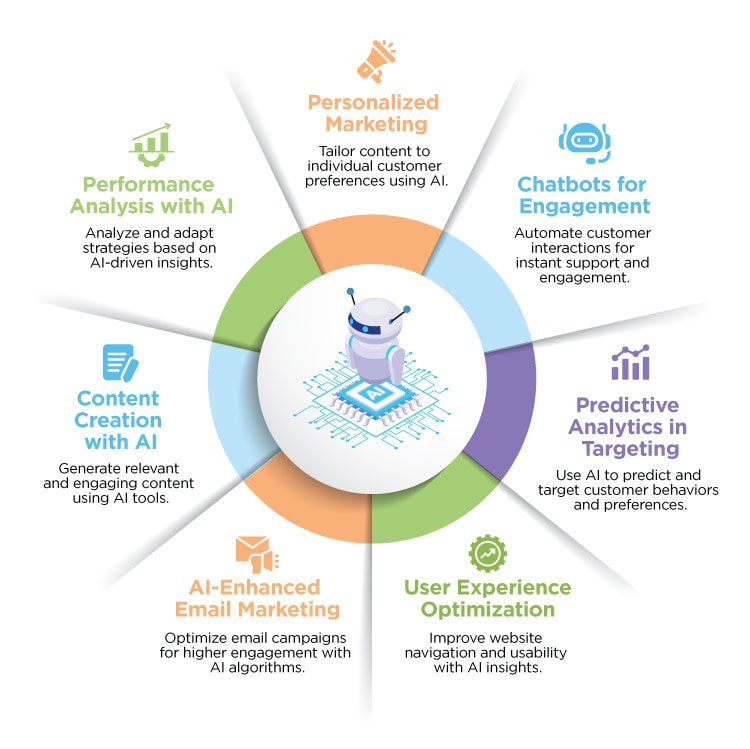
Source: Amura Marketing Technologies
AI offers many benefits to a marketing campaign. Here are some of the main results you’ll see when implementing AI marketing tools.
Personalization
AI algorithms analyze vast amounts of data, such as customer demographics and past behaviors. They identify patterns and preferences and deliver insights, enabling marketers to personalize individual consumers’ messaging, offers, and experiences.
Enhanced Data Analysis and Insights
AI can automate data collection and processing, preventing marketers from manually sifting through this information. LLMs can analyze this data to offer insights into a campaign and predict future SEO and paid media trends.
Marketers can rely on AI to provide insights on trends, preferences, and engagement metrics, gaining a deeper understanding of customer behavior and enabling faster data-informed decision-making.
Improved Customer Experiences
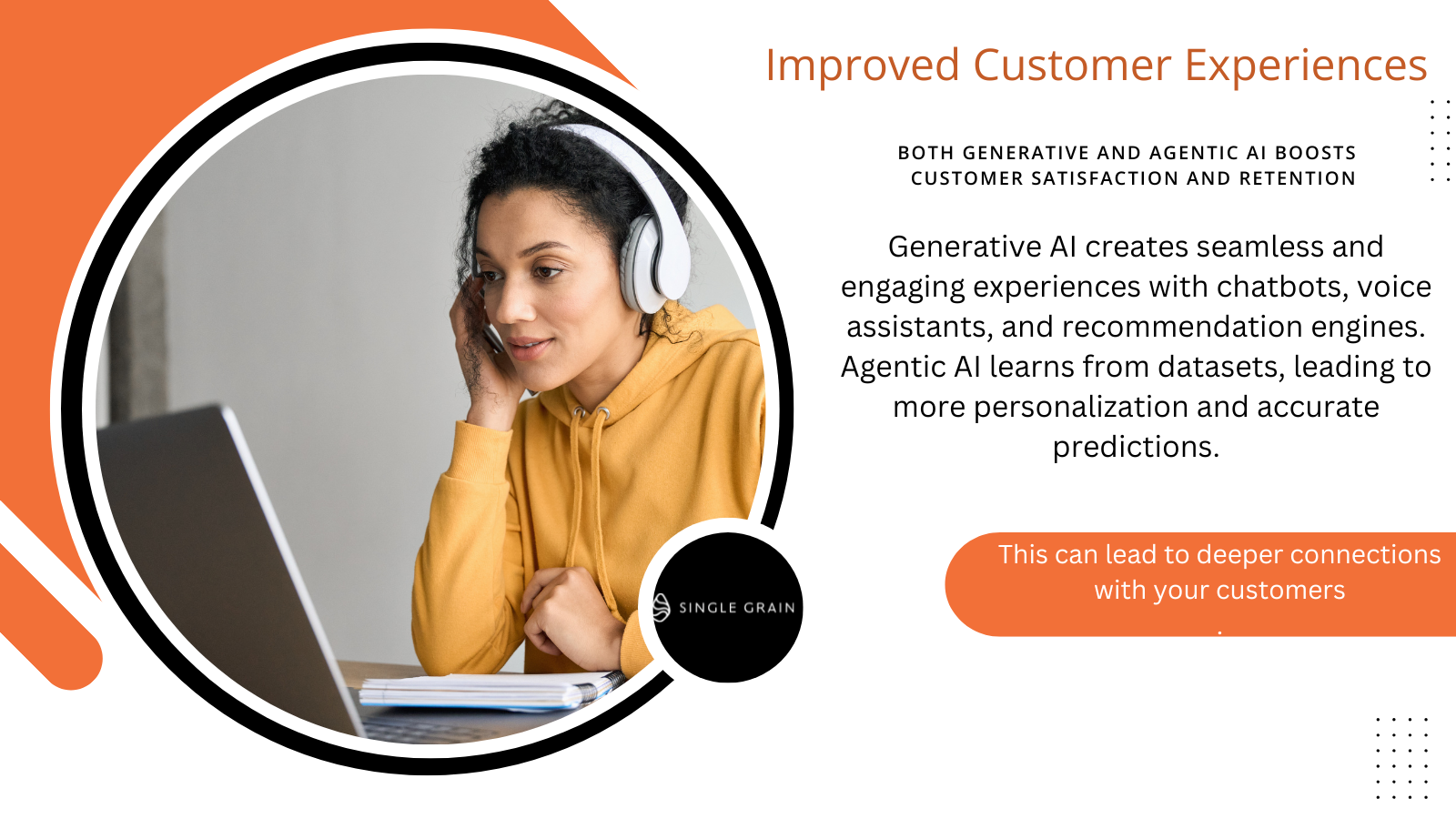
80% of customers who interacted with AI software had a positive experience. Both generative and agentic AI boosts customer satisfaction and retention.
Generative AI creates seamless and engaging experiences with chatbots, voice assistants, and recommendation engines. Agentic AI learns from datasets, leading to more personalization and accurate predictions. This can lead to deeper connections with your customers, especially since 60% of shoppers say they will become repeat buyers if they have a personalized experience.
AI can also benefit your strategy. As stated, agentic AI leads to more accurate predictions. This technology can score leads and know which ones are at a greater risk of churning. Marketers can either retarget those leads or use their budgets toward leads likelier to become customers.
Core Applications of AI in Marketing
Now that you’re convinced you need AI in your marketing campaign, navigating the different uses of these tools can still be challenging. Start by knowing the core strategies that benefit most from AI.
AI-Driven Content Creation and Curation
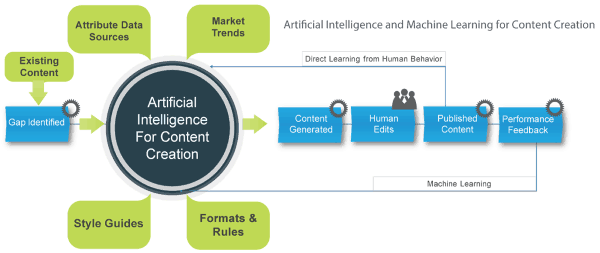
Source: Analytics Vidhya
AI-powered tools can generate content, from blog posts to social media captions. These tools use data to analyze what types of content perform well, helping marketers create compelling content that resonates with their audience. Additionally, AI helps curate content by recommending relevant articles or products based on a user’s interests.
There are best practices to know when optimizing your content strategy for AI. According to a Copyleaks report, 60% of AI-generated content is plagiarized.
Generative AI tools must analyze writing from other sources to create content. Educate your content staff on appropriate ways to use AI, such as using these tools to generate content ideas, write the first draft, and combine AI writing with human skills.
Email Marketing Automation
Machine learning can elevate your email marketing strategy. AI enables hyper-personalized email marketing by segmenting audiences based on behavior, preferences, and purchase history.
This technology will also use this data to discover the best send times, delivering your emails when your audience will most likely open them. Tools like AI-based A/B testing can determine which email subject lines, formats, or calls-to-action perform best, allowing brands to optimize email performance.
AI can automate all of these functions so you can focus on creating your email marketing strategy and crafting high-quality content that will convert your subscribers.
Social Media Marketing and Sentiment Analysis
AI is making waves with social media marketing success. This technology allows brands to monitor social media for brand mentions and engagements. Marketers can also use AI to discover the best hashtags, ensuring your posts reach your target audience.
AI can also conduct sentiment analysis to understand your audience better. A sentiment analysis measures your audience’s emotional needs by gauging their social media behaviors. With this strategy, marketers can gain insight into how consumers feel about a brand or product and respond proactively.
AI works in the background to deliver results; marketers only need to create social media content and interact with followers.
Paid Media
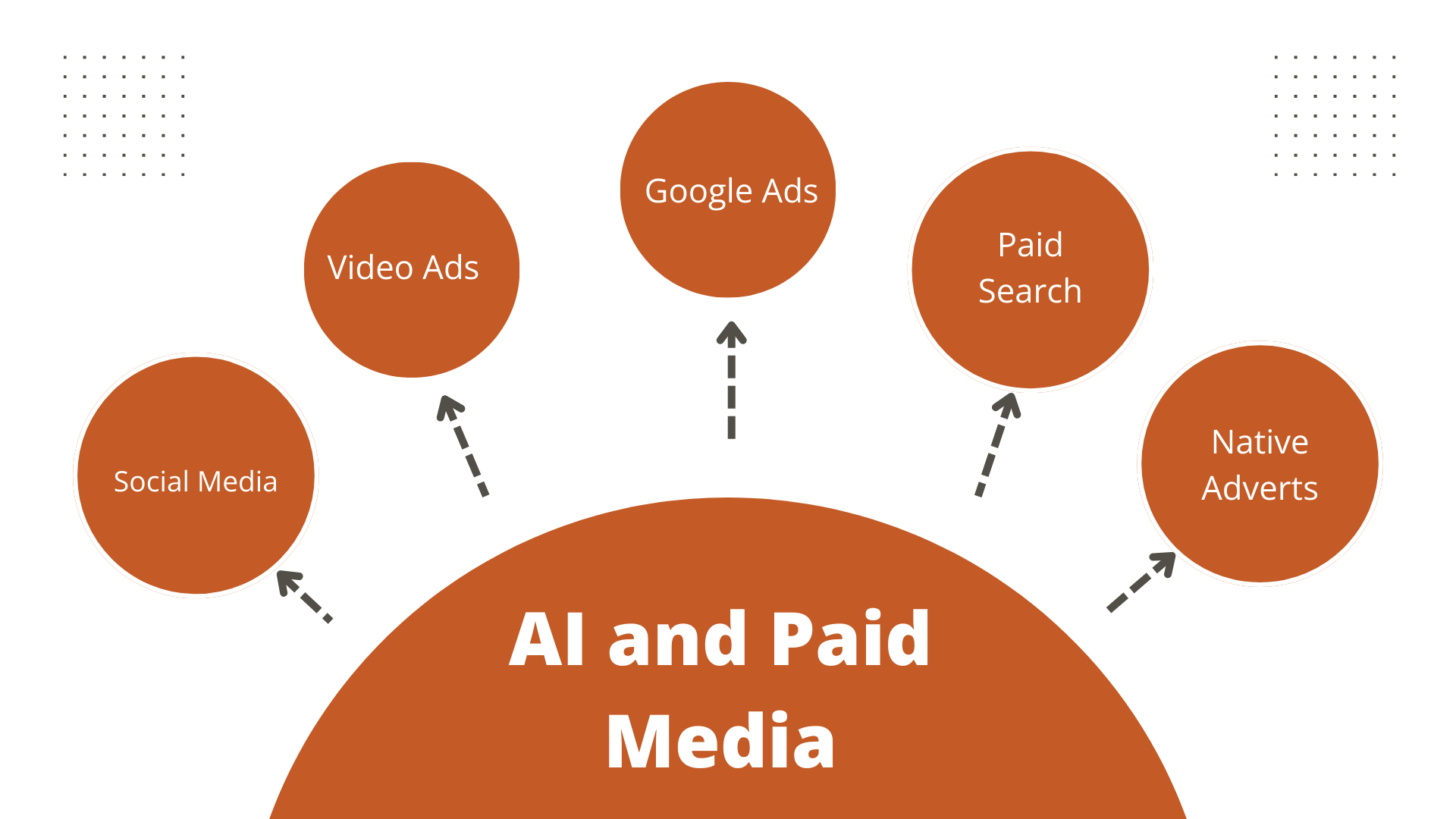
Generative AI tools can optimize a paid media strategy in many ways. AI algorithms analyze vast data sets to identify high-performing segments and predict user behaviors, ensuring ads reach the most relevant audiences.
These tools can target the best leads by gauging the performance of past paid media campaigns. AI can adjust bids automatically, ensuring you never exceed your advertising budget.
There are other ways you can use AI in a paid media strategy. AI also enhances ad creativity, automating A/B testing for visuals, messaging, and formats to determine the most effective combinations.
Remember that your ad strategy should vary depending on the medium. For example, when running a paid media campaign for video, AI will favor shorter video ads to accommodate short attention spans.
Customer Segmentation
We’ve been mentioning customer segmentation quite a bit, so let’s discuss how AI can better target specific consumer groups.
Different tools, like predictive generative AI, analyze data patterns to understand which user demographics are buying your products and services, their engagement levels, and their purchase history.
The AI will then take that data and automate customer segmentation, giving you a better snapshot of your ideal buyer. This can help marketers create highly tailored messages that target customers individually.
Predictive Analytics for Lead Scoring
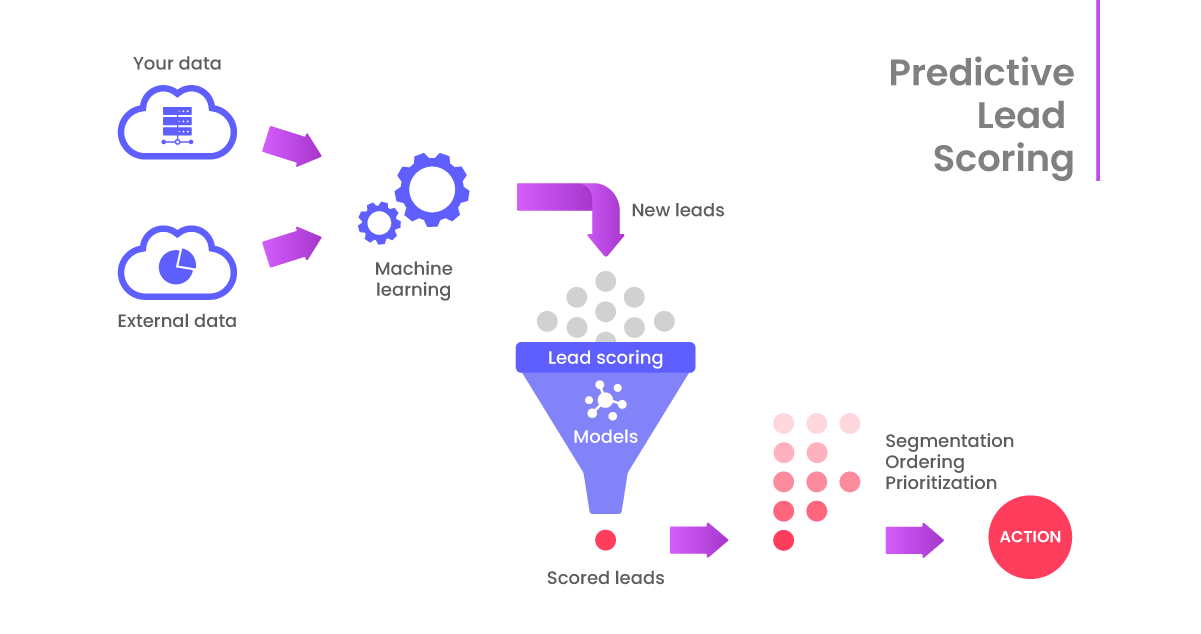
Source: SkyPlanner
Predictive analysis is the use of data to predict future events and trends. AI achieves predictive analytics by measuring historical data to identify possible future scenarios. This technology can help marketers in many ways, such as by offering data-driven insights and optimizing marketing budgets.
Lead scoring is one of the most popular ways marketers use predictive analysis. Predictive lead scoring technology analyzes customer data to forecast potential lead outcomes and better map the customer journey.
All this data helps AI score leads based on their likelihood of conversion. These models help sales teams prioritize leads and focus their efforts where there’s the highest potential for conversion.
Technical SEO
Can AI perform a technical SEO analysis on a website? AI has been transforming technical SEO for a long time.
Marketers can use AI web scraping tools to extract data from websites. These tools use machine learning to crawl web files and record their findings. From here, they can analyze website structure, crawlability, and load speeds, providing actionable insights to enhance user experience and ranking potential.
In addition, AI can identify patterns in search algorithms, which helps marketers more effectively adapt to search engine updates.
Technical SEO covers more than just a website’s structure. AI-powered content analysis also ensures pages align with search intent by examining keyword relevance, entity relationships, and content gaps. Additionally, AI-driven automation can optimize meta tags, alt text, and internal linking, reducing manual workload.
This is why AI has made search results 40% more effective.
Programmatic SEO and CRO
Since AI has generated better SEO results for 65% of companies, more marketers are implementing programmatic SEO. Programmatic SEO is a strategy that uses automation to optimize several web pages at scale, ensuring they rank better in SERPs.
AI uses machine learning algorithms to identify high-value keywords and generate optimized content templates. It can also automate internal linking, ensuring each page aligns with user intent. AI also continuously refines content based on performance data, enhancing relevance and rankings over time.
SEO isn’t the only method to increase sales and leads. If this is your primary goal, businesses must also implement conversion rate optimization (CRO). CRO involves techniques to improve the user experience, making it likelier for these leads to convert.
Like programmatic SEO, programmatic CRO automates these engagement-boosting tactics, increasing efficiency in your campaign.
AI in programmatic CRO analyzes user behavior patterns and segments audiences in real-time. CRO tools can adjust site layouts, call-to-action buttons, messaging, and content. Machine learning algorithms assess which variations lead to higher engagement and conversions, refining these elements continuously.
AI also powers predictive analytics, helping marketers anticipate user actions and implement data-backed adjustments. This automated, personalized approach enhances the user experience and increases conversion rates by delivering the most relevant content to each visitor.
While AI can help increase brand awareness and sales, increasing conversions takes expertise. Contact our CRO experts here at Single Grain if you’re ready to see revenue-tied results from your CRO strategy.
AI Technologies Transforming Marketing
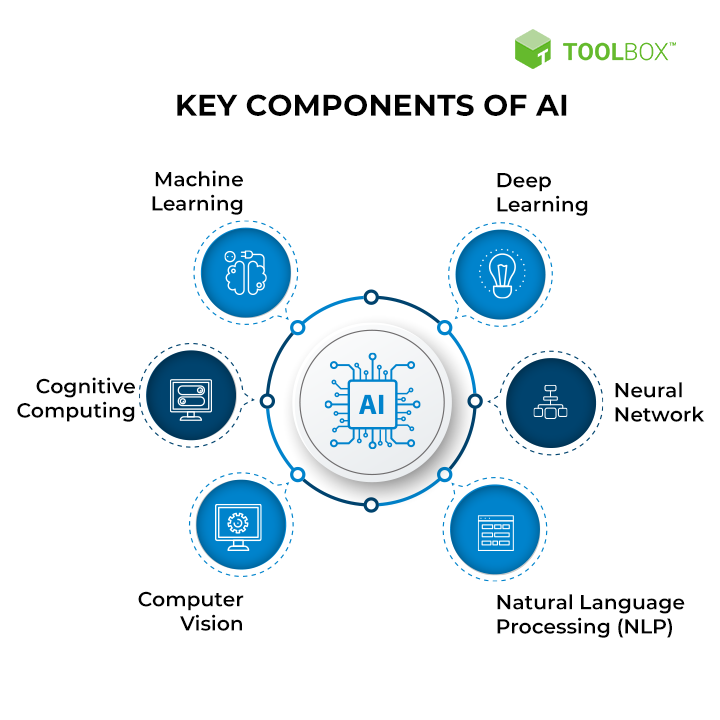
Source: Spiceworks
AI’s marketing functions are extremely impressive. These tools can analyze datasets in real time to segment audiences and make data-driven insights that boost engagement rates. But what are these specific technologies that are revolutionizing marketing?
Machine Learning
Machine learning is a subset of AI. This technology can analyze existing data for a specific purpose. Marketers can tailor machine learning to different goals and tactics, automating these strategies to achieve a particular outcome.
Machine learning also uses historical data to predict future behavior. This technology helps brands forecast sales, anticipate customer needs, and determine the best channels and strategies to reach specific goals.
Predictive Analytics
Predictive analytics is part of machine learning but also has such robust capabilities that it deserves its own category.
It uses different technologies like machine learning, statistical models, and AI to find patterns in complex datasets. Predictive analytics will use their findings to forecast future trends and outcomes.
This technology is transforming marketing by enabling brands to anticipate customer behavior. Marketers can use these data-driven insights to create personalized campaigns, improve customer segmentation, and enhance product recommendations.
Predictive models allow companies to forecast customer lifetime value and optimize lead scoring. This approach enhances decision-making and reduces guesswork, leading to more effective marketing strategies that improve customer engagement and retention.
Why is this technology worth it? A whitepaper from IBM and IDC states that organizations using predictive analytics report an ROI of 250%.
Natural Language Processing (NLP)
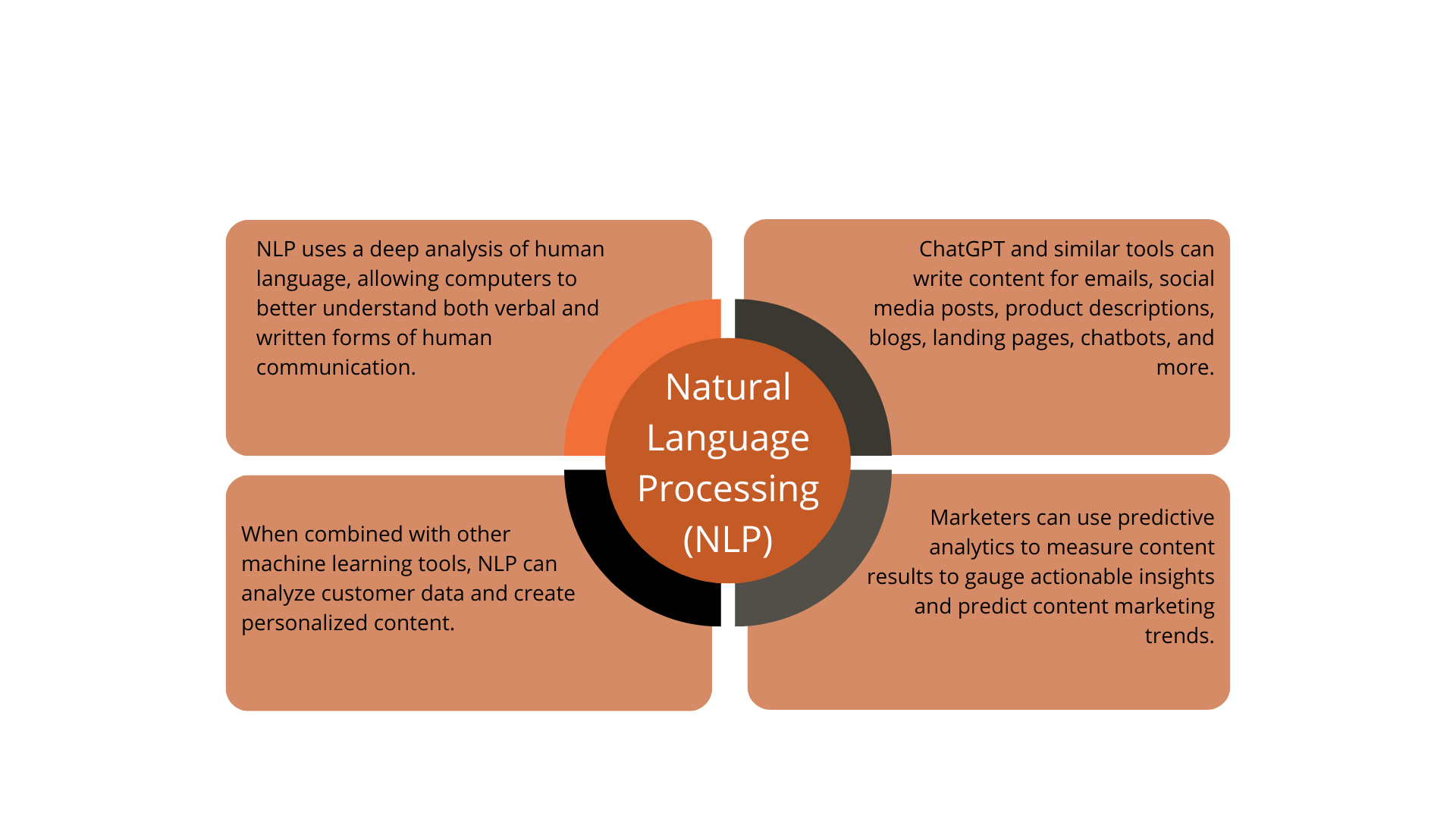
Natural language processing (NLP) has brought content creation to new levels of speed and quality (when handled correctly). NLP uses a deep analysis of human language, allowing computers to better understand verbal and written communication forms.
Since ChatGPT was released in 2022, marketers have used NLP writing bots for various functions. ChatGPT and similar tools can write content for emails, social media posts, product descriptions, blogs, landing pages, chatbots, and more.
Initially, marketers used NLP tools to automate the content creation process. However, NLP is expanding the way we communicate with customers.
When combined with other machine-learning tools, NLP can analyze customer data and create personalized content. NLP-driven tools can scan and analyze customer reviews, social media posts, and support tickets, helping brands gather insights into their customers’ needs. Other tactics, such as sentiment analysis, ensure you target a consumer’s emotional needs.
Marketers can use predictive analytics to measure content results, gauge actionable insights, and predict content marketing trends.
While AI can expedite content creation, you’ll still need experts to ensure your content converts. Need help with this? Give us a call.
Conversational AI
While chatbots use NLP to craft responses, they also use conversational AI to analyze customer interactions and respond in real-time. Conversational AI uses NLP to process human language, but chatbot technology takes generative AI capabilities to new levels.
Chatbots use AI to simulate conversations, providing immediate responses to customer inquiries and delivering information quickly. These bots can handle customer questions, offer product suggestions, and even manage orders, freeing up human agents for more specific interactions.
With more businesses implementing chatbots, 91% of organizations feel optimistic about using AI to increase customer engagement.
Computer Vision
Computer vision is an AI that helps computers analyze information from videos and images. This technology is reshaping marketing by gaining insights from visual data and using this information to increase sales.
In marketing, this technology is used in visual search, where users can upload an image to search for similar products or use image recognition for targeted advertising.
Companies that implement computer vision into their campaigns are expected to profit 51% compared to those that don’t.
AI Tools and Platforms for Marketers
Expanding your use of AI tools is integral if your organization is undergoing a digital marketing transformation strategy. These agentic workflows are scalable and encompass many marketing tasks. Here are our favorite AI tools, organized by function.
Automation
When it comes to digital marketing transformation, integration is key. You’ll have many tools, and organizing them into one process will make everything smoother. Numerous automation AI tools can manage all your different systems, but here are the ones we recommend.
SalesLoft
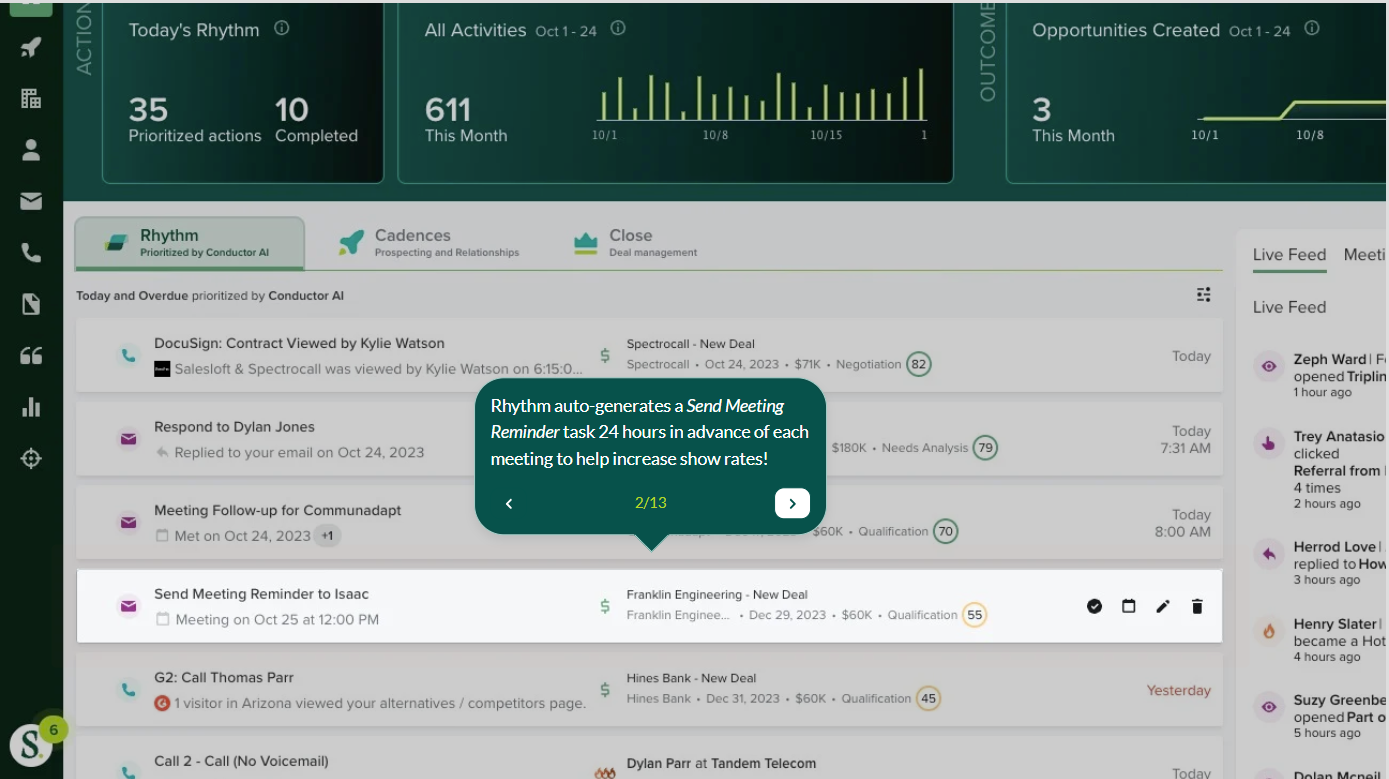
SalesLoft is a leading sales engagement platform that offers several digital marketing and sales tools in one place, helping sales teams streamline and optimize their workflows.
It provides tools for managing chatbots, tracking sales activities, and automating personalized outreach across multiple channels, such as email and social media. This makes it so sales and marketing teams can make their workflows more tidy and efficient.
SalesLoft’s analytics offer insights into prospect engagement, ensuring sales representatives build stronger customer relationships. Trusted by many organizations, SalesLoft empowers teams to enhance productivity, achieve quota, and drive revenue growth effectively.
Zapier
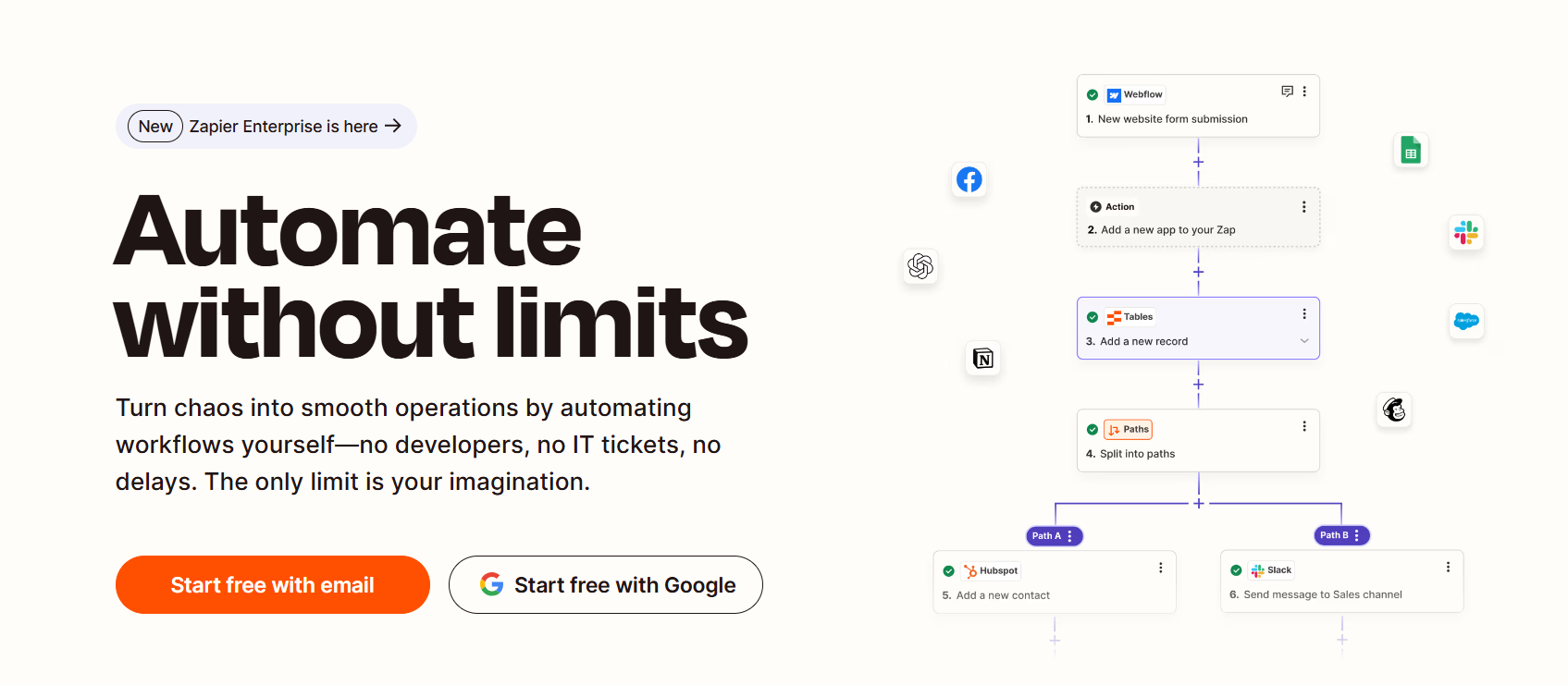
When it comes to AI-driven automation, Zapier is one of the most trusted tools. Marketers can integrate over 5,000 apps into Zapier, and this program will streamline workflows by automating the most time-consuming tasks.
Zapier not only cuts down on manual work but also offers valuable insights. The best part? You don’t need coding skills to use this software. Anyone can set up “Zaps,” which are automated workflows. Users can link applications like Gmail, Slack, Trello, and Salesforce to work seamlessly together.
How do Zaps work? Zapier can automatically save email attachments to Dropbox or send new leads from Facebook Ads directly to your chosen CRM (which we will cover next). It’s flexible, easy to use, saves time, reduces errors, and improves productivity.
Zapier offers a free service, but organizations can scale up to one of their paid plans.
Customer Relation Management (CRMS)
CRMs centralize customer data to automate tasks and offer insights, benefitting any digital marketing strategy. These are some of the most robust CRMs on the market.
Salesforce

Salesforce is a leading customer relationship management (CRM) platform that offers customer service, sales, analytics, and marketing automation in one place. This system provides solutions for various industries, such as e-commerce, automotive, education, healthcare, finance, manufacturing, retail, travel, and technology. That said, its customizable solutions make it adaptable to businesses of all sizes.
One of Salesforce’s best aspects is that marketers and sales professionals can access the most transformative tech on this one platform. Salesforce offers predictive analysis and machine learning to scan customer data and identify patterns. This is useful for lead scoring and gauging churn rates.
With other features like Sales Cloud for sales automation, Service Cloud for customer support, and Marketing Cloud for digital marketing, Salesforce empowers organizations to streamline workflows and make data-driven decisions.
To centralize data, Salesforce integrates with various marketing and social media apps to understand your audience demographics and deliver customer insights to sales teams. This can help sales and marketing professionals deliver personalized campaigns and help businesses manage interactions with customers and prospects.
HubSpot
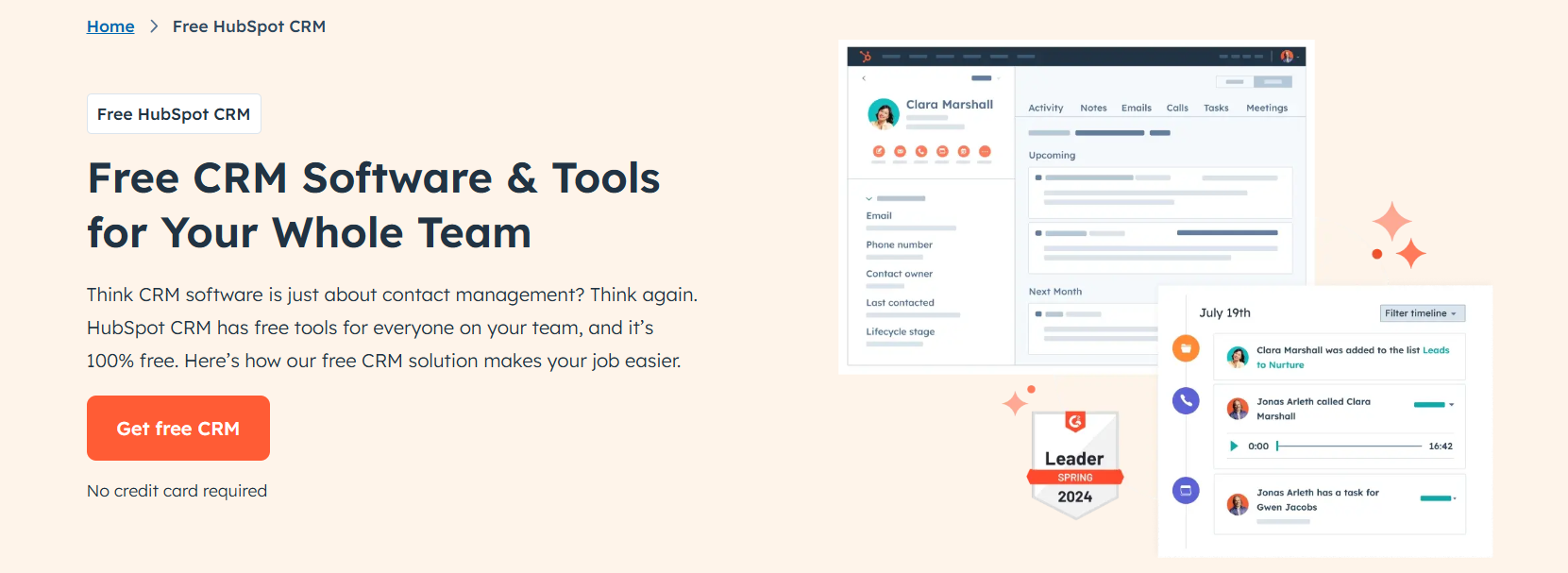
HubSpot is an all-in-one digital marketing, sales, and customer service platform designed to help businesses attract, engage, and delight customers.
With HubSpot’s CRM, companies can manage contacts, track customer interactions, and streamline sales processes. Known for its user-friendly interface, it can integrate with various apps and simplify workflows. HubSpot’s automation features make it easy for teams to nurture leads, personalize outreach, and measure campaign effectiveness.
HubSpot also offers solutions for content management, email marketing, social media, lead generation, and analytics.
The platform’s CRM is free, but you can scale up to their paid plans if you need more customizations and features. Even though HubSpot is widely used by small to mid-sized companies, there are options for larger organizations to build strong customer relationships and drive growth efficiently.
Optimove
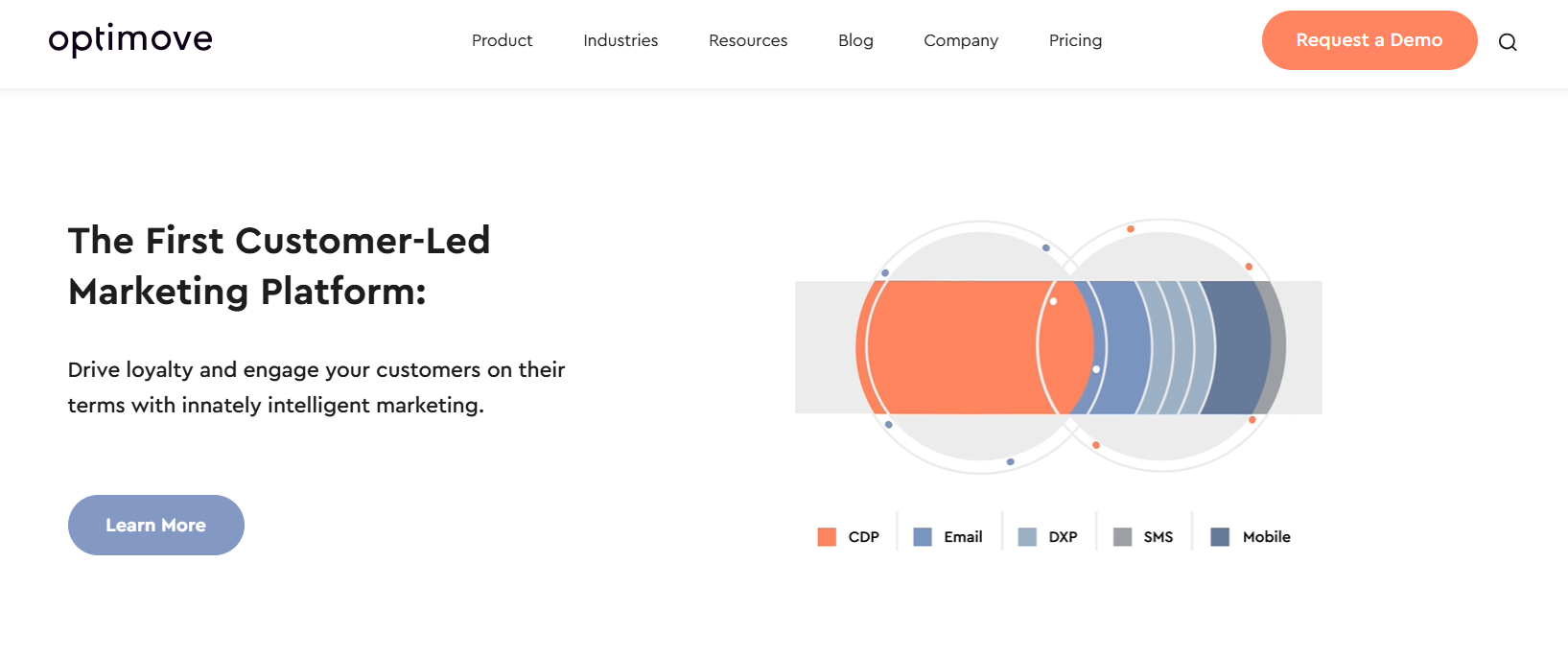
Optimove is a CRM and digital marketing platform focused on optimizing retention and loyalty in your campaign. It automates many features in one place, such as A/B testing, customer segmentation, and multi-channel tracking.
Optimove is so effective because it uses predictive analytics. This technology enables personalized, data-driven marketing and sales campaigns.
Since Optimove has numerous features and add-ons, it provides custom pricing to every client.
SEO
Many SEO tools can improve various aspects of your campaign, even though a professional service will take your search engine performance to new heights. Here are the highest-quality SEO platforms.
Keyword Insights
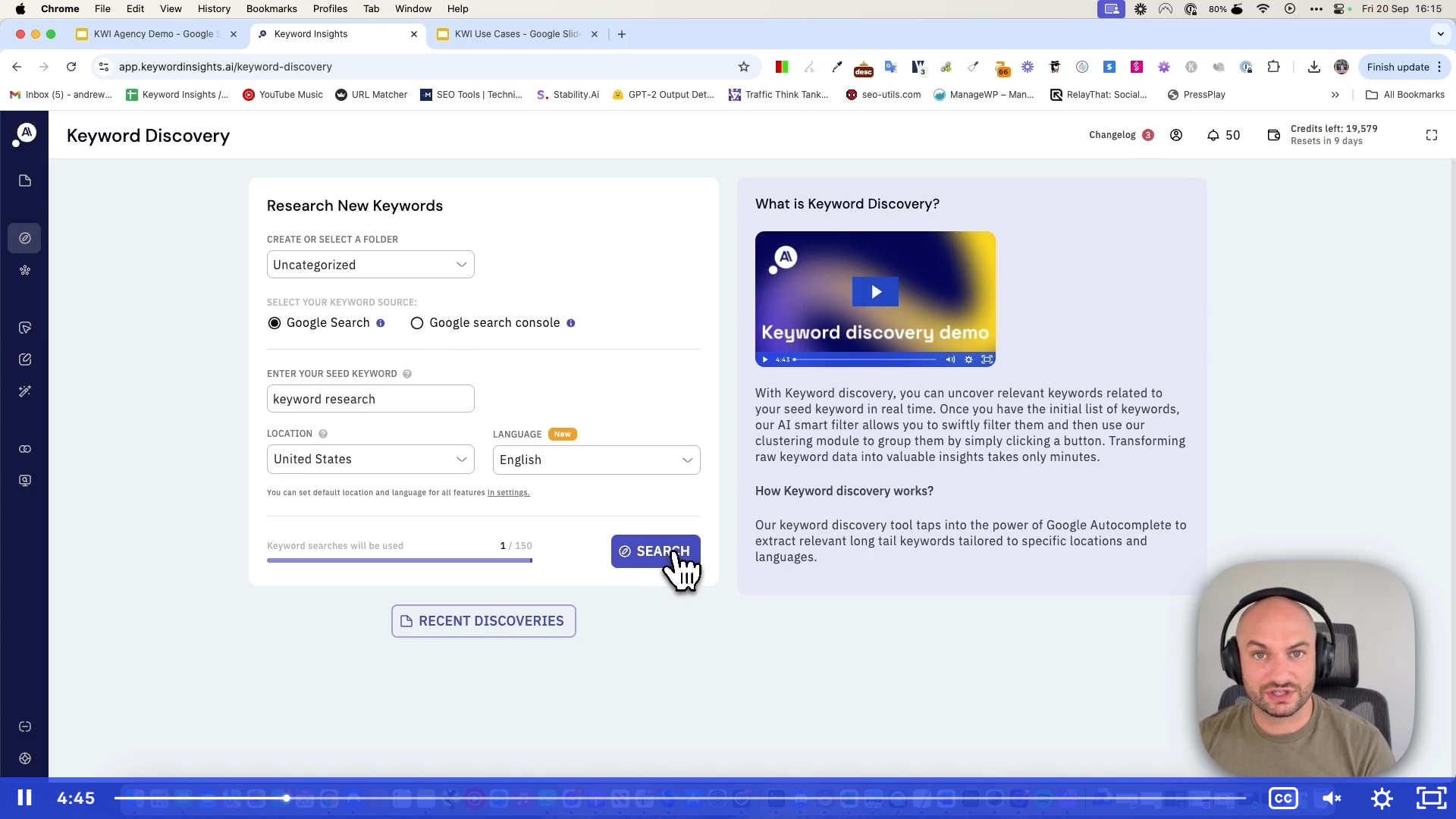
Keyword Insights is an AI tool that blends content writing and keyword research. It can analyze search data to offer suggestions that better optimize your content.
Not surprisingly, Keyword Insights is most famous for its powerful keyword optimizations. Keyword Insights automates keyword searches by intent, volume, and competitive landscape. It groups related keywords and identifies high-potential topics.
Marketers can use Keyword Insights to optimize various forms of content, from product descriptions to short—and long-form blogs.
Surfer SEO
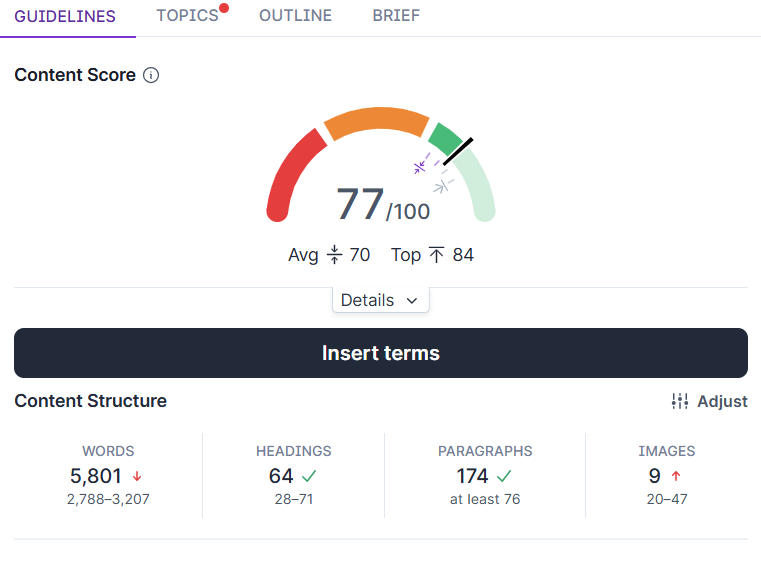
Surfer SEO is a tool that optimizes your content for search engines in real-time. Writers type directly into Sufer SEO’s Content Editor, and Surfer SEO scores your content based on over 500 on-page signals. The most critical factors include readability, keyword density, number of headers, word count, and images.
Surfer SEO’s bots will also research your blog topic, recommend additional topics, and suggest headers and FAQs. To pull this data, Surfer SEO considers your niche, competitors, and target audience. Surfer SEO’s auditing features allow users to analyze existing content and identify optimization opportunities.
Surfer SEO offers numerous integrations, such as Google Docs, WordPress, and Jasper.
Paid Media
If you don’t streamline your advertising campaign, you risk wasting time and money if you’re not already working with an expert team. These tools optimize your advertising campaign.
Albert.ai
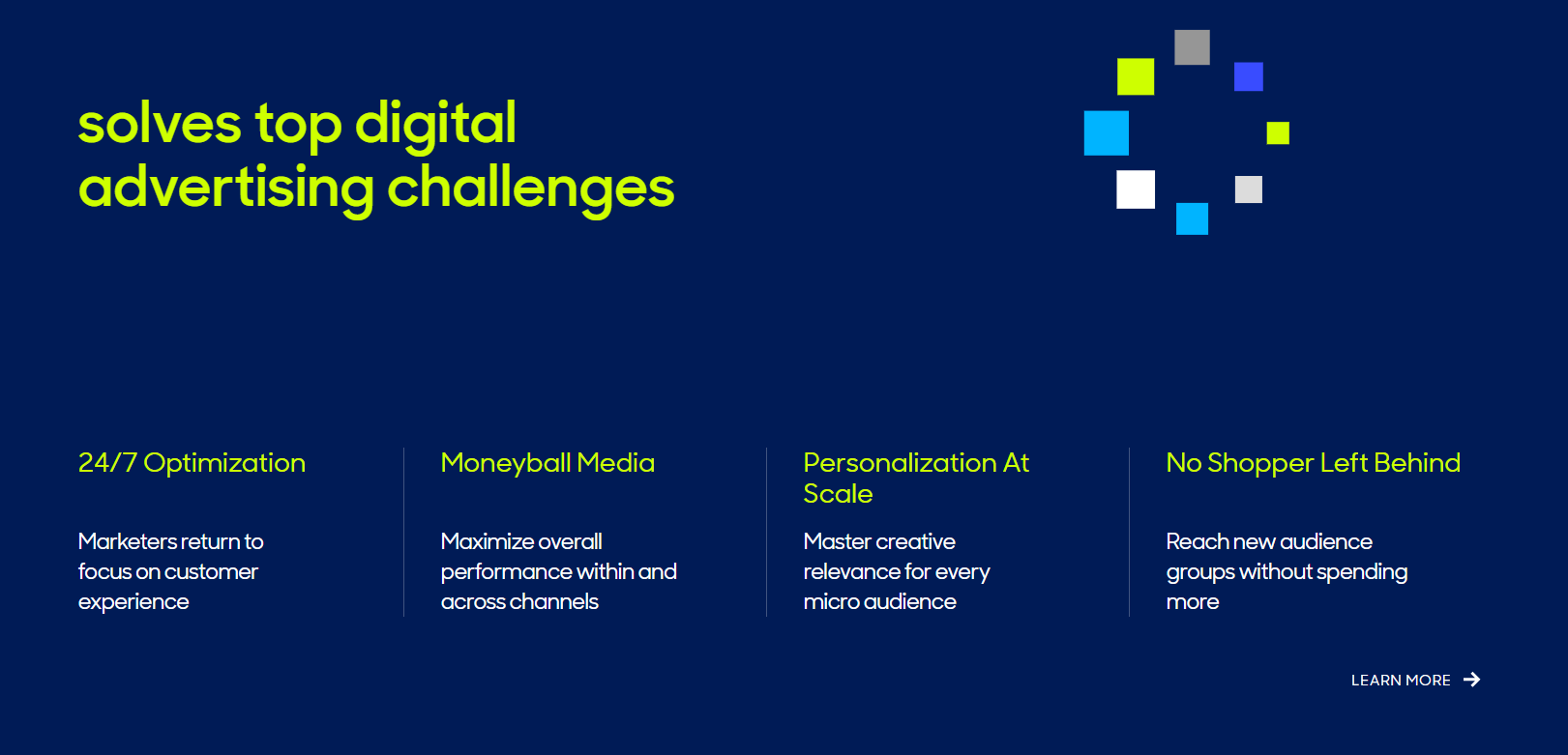
Albert.ai is an AI-powered marketing platform that automates digital advertising campaigns across search, social media, and display channels. This tool can automate many advertising tasks, such as optimizing ad spend and conducting keyword research. Albert.ai optimizes real-time audience targeting and bid management to achieve better results.
Albert analyzes and adjusts campaigns based on performance data, ensuring you drive engagement and conversions. The impressive reporting features measure the success of your advertising and marketing campaigns, while its automation capabilities free up time for strategic planning.
Albert.ai has customized pricing, which means you will have to contact them for a quote.
Smartly.io
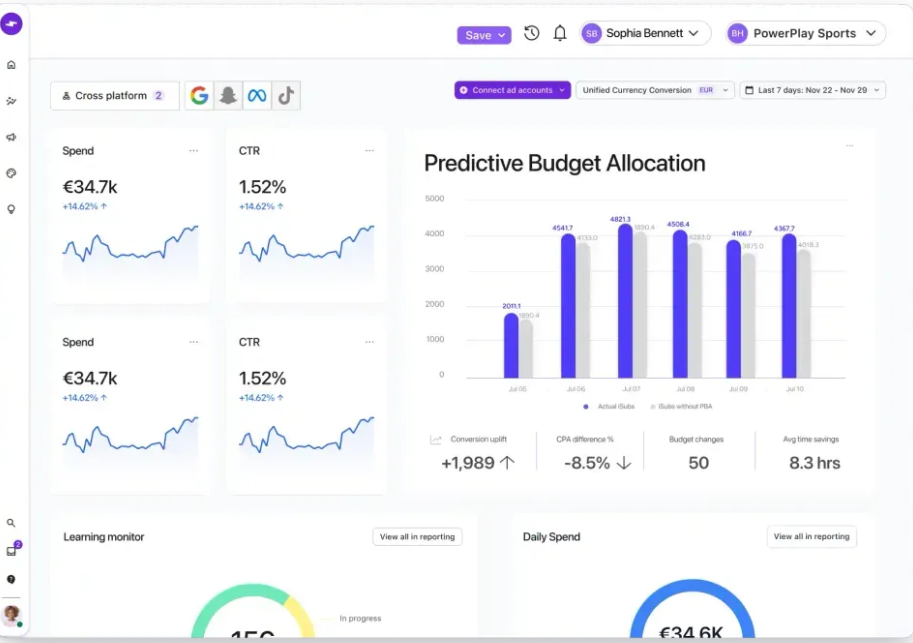
Smartly.io is an AI-driven social media advertising platform. This tool helps brands create, manage, and optimize ad campaigns across platforms like Facebook, Instagram, Snapchat, and TikTok.
With Smartly.io, advertisers can optimize cross-channel ad campaigns and automate various tasks, such as creating creatives. The platform is also optimized for collaboration, making it easier for teams to manage high volumes of ads.
Smartly.io can also conduct a social media analysis to predict future trends. With features like A/B testing and performance insights, Smartly.io empowers advertisers to make data-driven decisions.
Content Creation and Editing
Content writing is a core part of digital marketing and SEO. Fortunately, various programs are available that expedite the writing and editing process. Here are some of the best for your marketing campaigns.
Jasper
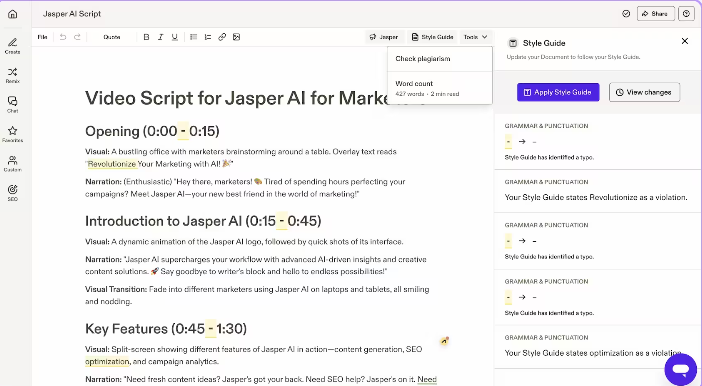
Jasper is an AI writer that can write copy in various styles and tones, making this an ideal tool for businesses in all niches. Like many AI writers, Jasper uses NLP to write product descriptions, emails, landing pages, social media content, ad copy, and blogs.
Jasper AI also offers SEO tools and makes content recommendations. Its dashboard is simple to use, and its AI is intuitive, helping speed up the content creation process even more.
Unlike its competitors, Jasper AI isn’t free. You can view its plans and pricing here.
Hemingway Editor
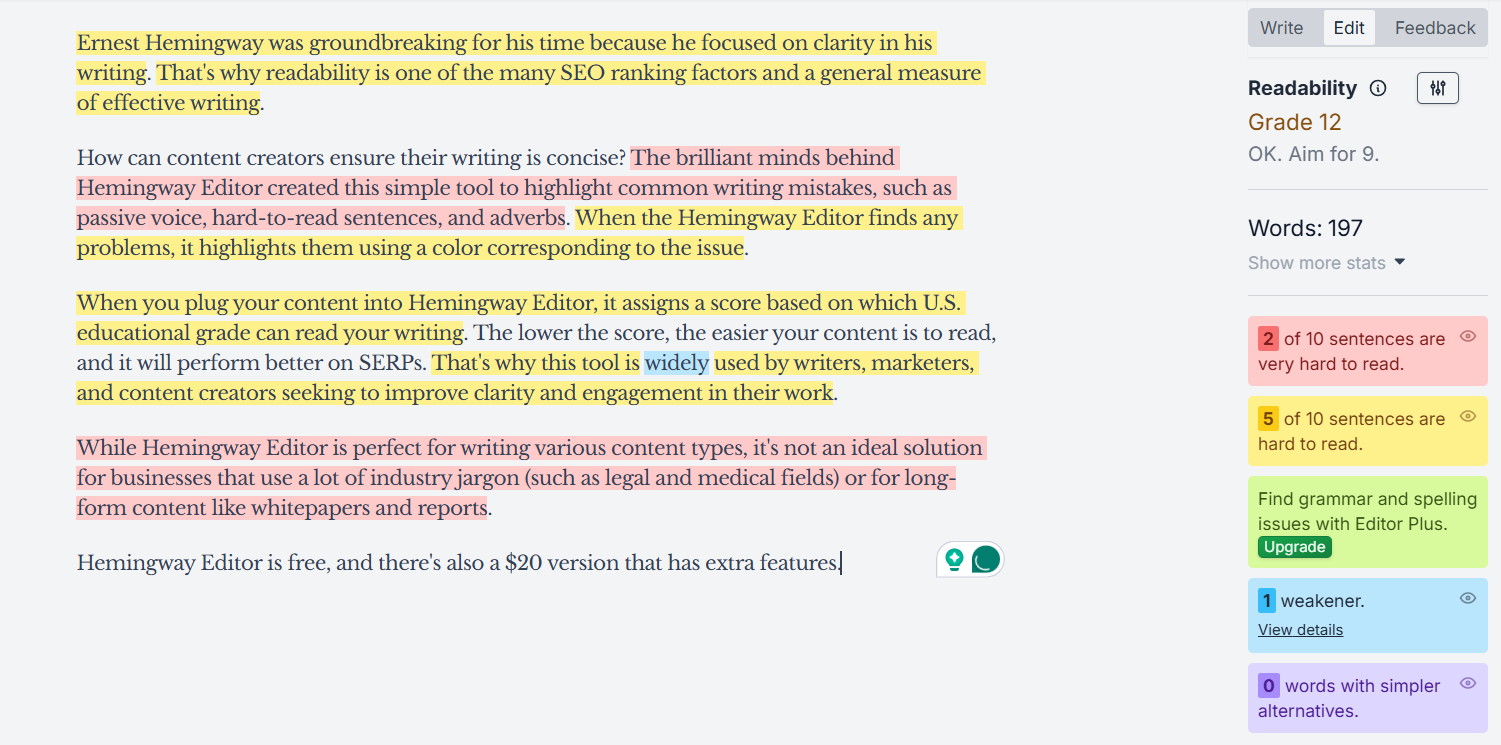
Ernest Hemingway was groundbreaking for his time because he focused on clarity in his writing. That’s why readability is one of the many SEO ranking factors and a general measure of effective writing.
How can content creators ensure their writing is concise? The brilliant minds behind Hemingway Editor created this simple tool to highlight common writing mistakes, such as passive voice, hard-to-read sentences, and adverbs. When the Hemingway Editor finds any problems, it highlights them using a color corresponding to the issue.
When you plug your content into Hemingway Editor, it assigns a score based on which U.S. educational grade can read your writing. The lower the score, the easier your content is to read, and it will perform better on SERPs. That’s why this tool is widely used by writers, marketers, and content creators seeking to improve clarity and engagement in their work.
While Hemingway Editor is perfect for writing various content types, it’s not an ideal solution for businesses that use a lot of industry jargon (such as legal and medical fields) or for long-form content like whitepapers and reports.
Hemingway Editor is free, and there’s also a $20 version that has extra features.
Grammarly

Grammarly has become the dominant force in spellcheckers. By now, it might feel like old news, but it’s still a strong force that content marketers ought to use for content hygiene and optimization. Its advanced AI analyzes your content in real time and highlights spelling, grammar, punctuation, and syntax errors. When you hover over the highlighted part, Grammarly offers corrections. If you choose not to use its suggestions, all you need to do is click “Dismiss.”
Grammarly is more than just a spellchecker. If you subscribe to Grammarly Premium, it can offer suggestions on ways to improve your writing. These include stylistic changes, removing redundant words and phrases, and recommending alternative synonyms. Grammarly uses different colors for these changes so that you can differentiate between errors and suggestions.
This tool supports multiple English dialects, such as American and British English, and adjusts to different writing styles, such as academic, business, or casual.
Grammarly has a browser extension, desktop app, and online editor. It integrates with Microsoft Word, Gmail, and various social media platforms to ensure all your content is error-free.
Students, professionals, and businesses widely use Grammarly to maintain polished, error-free writing, making it a versatile tool for enhancing written communication.
Frase.io
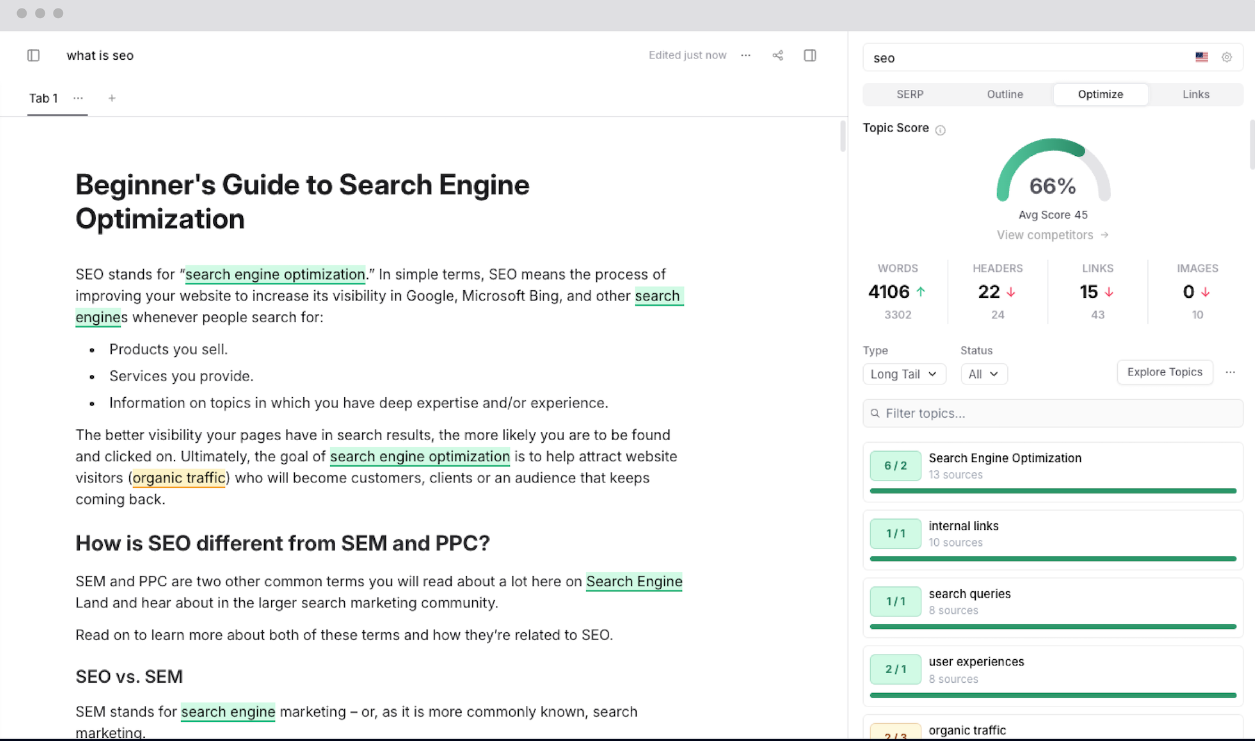
Frase.io is a tool that uses NLP to write and edit SEO content. Marketers can write, research, and optimize content all in one place.
Frase.io can also analyze search queries to identify top-ranking web pages and extract their keywords and other data that put them at the top of SERPs. It provides AI-driven content suggestions and outlines, helping users craft well-researched articles and blog posts that rank higher in search engine results.
Frase offers a free plan, and you can upgrade to a paid service if you need more add-ons.
Email Marketing
AI can automate many email marketing strategies, removing several labor-intensive and repetitive tasks. Here are AI email marketing tools to improve your campaign.
Seventh Sense
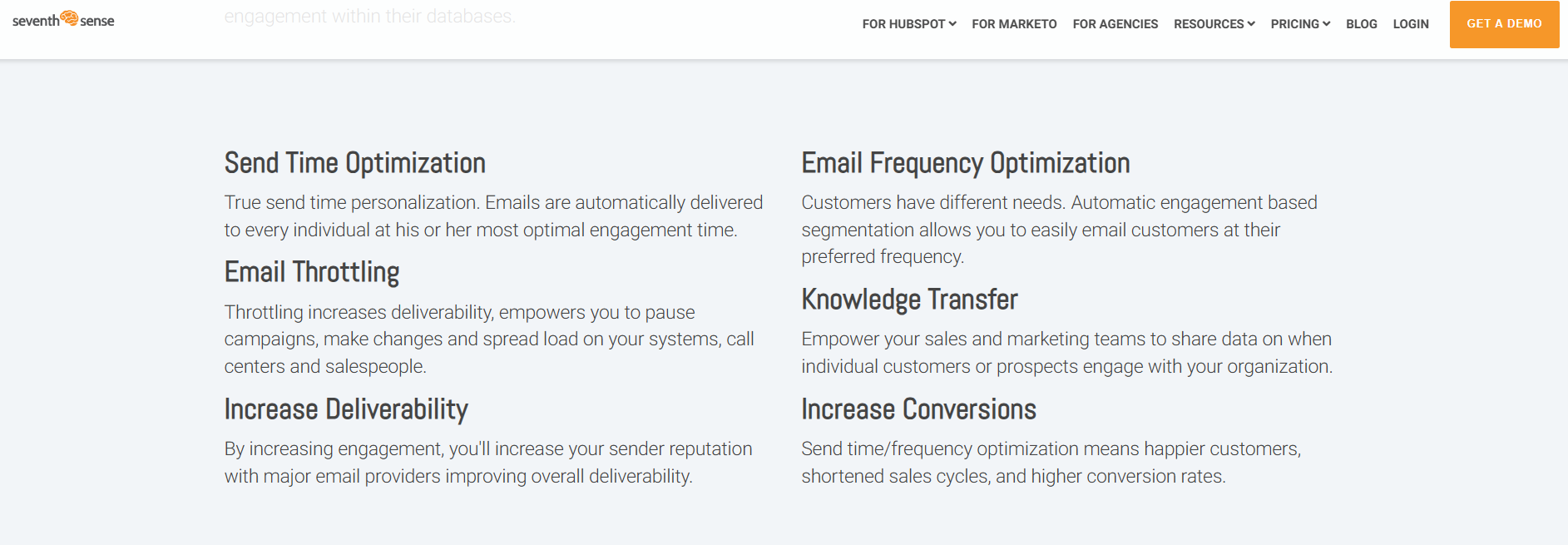
Seventh Sense is an email marketing tool that optimizes your campaign with behavior profiling. It uses predictive analytics to gauge the best send times, ensuring recipients will open and engage with your emails. Seventh Sense integrates with popular platforms like HubSpot and Salesforce to analyze data for each recipient.
Milled
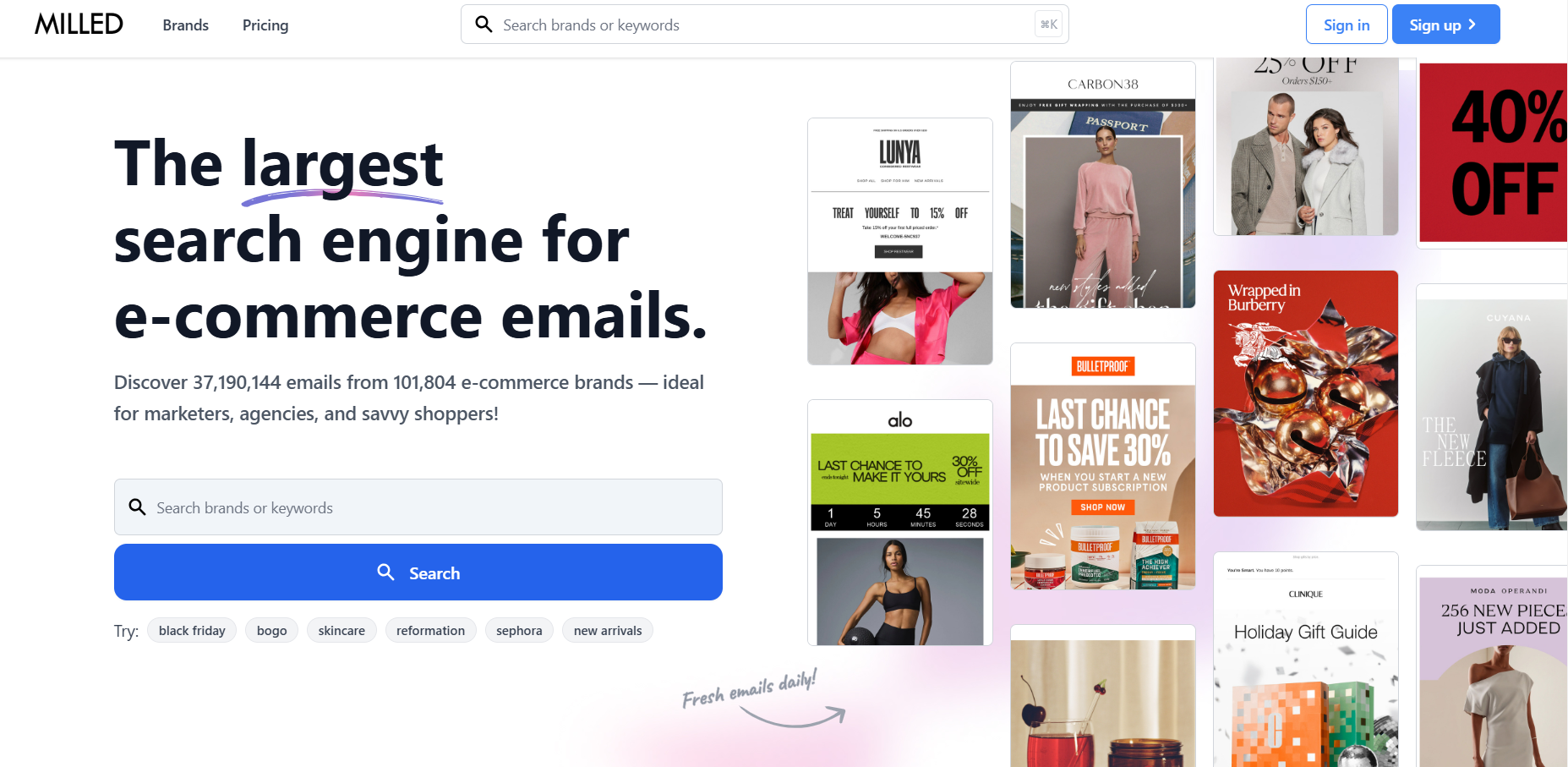
If you want to conduct a competitor analysis for email marketing, Milled is the best platform. It’s a search engine for email campaigns, where you can access 36 million emails from over 10,000 e-commerce companies. With its easy-to-use interface, Milled makes it simple for users to find specific promotions or email styles.
Consumers use Milled to browse, discover, and explore the latest offers, sales, and promotions. However, marketers can use Milled to track competitors and find the latest email marketing trends. Milled also offers AI creative tools to optimize your marketing strategies better.
The best part? You can use Milled for free.
Reply.io
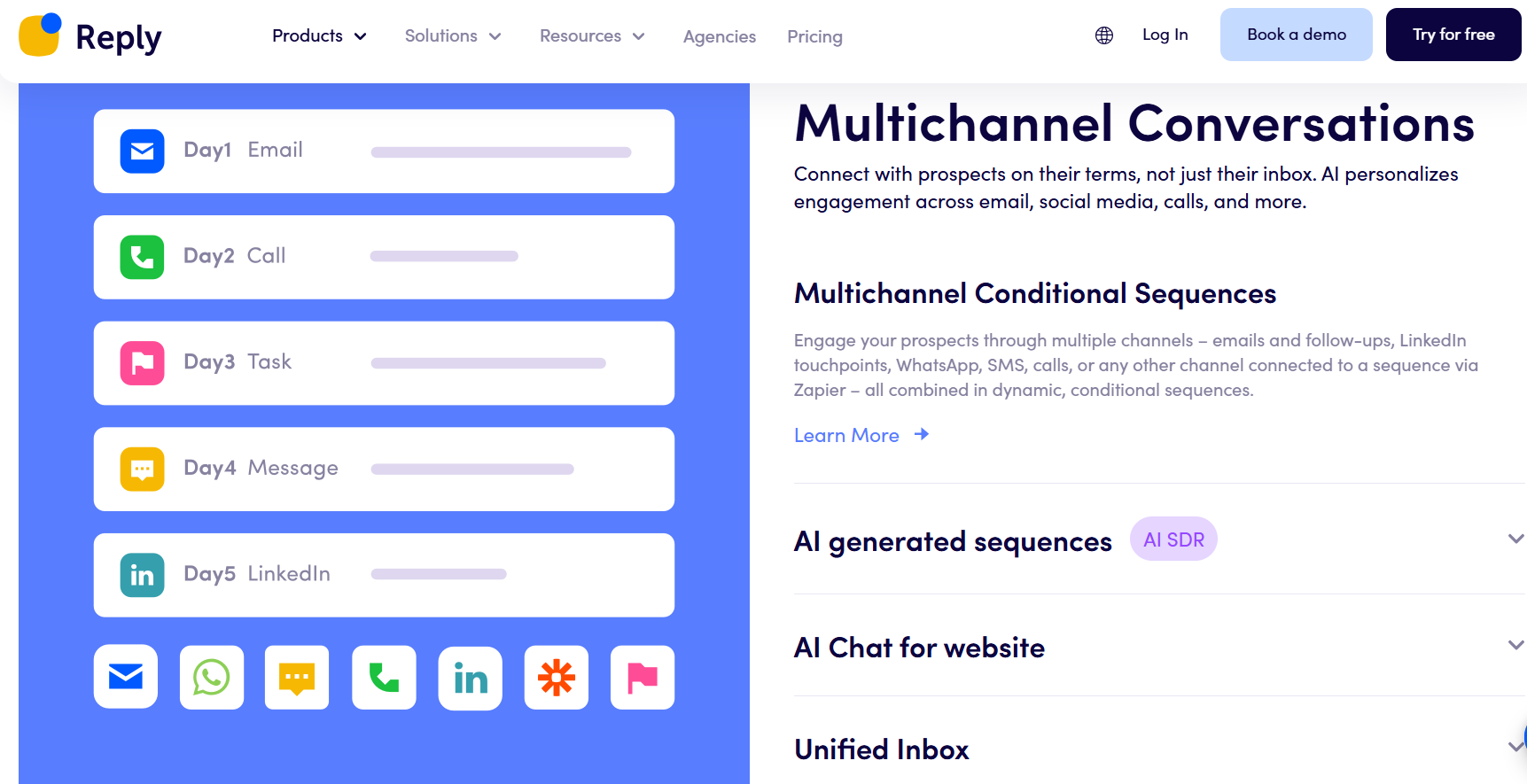
Reply.io is more than just an AI marketing tool for email. It’s optimized for sales outreach and offers many AI tools to convert leads. Reply.io automates prospecting, follow-ups, and multi-channel outreach.
Reply.io also offers automated personalized outreach sequences, tracking, and meeting scheduling. It allows sales teams to engage with prospects via email, phone, LinkedIn, and other channels. The platform also provides detailed analytics to assess campaign performance.
Reply.io offers various flexible and scalable plans, plus the option to bill annually.
ZeroBounce
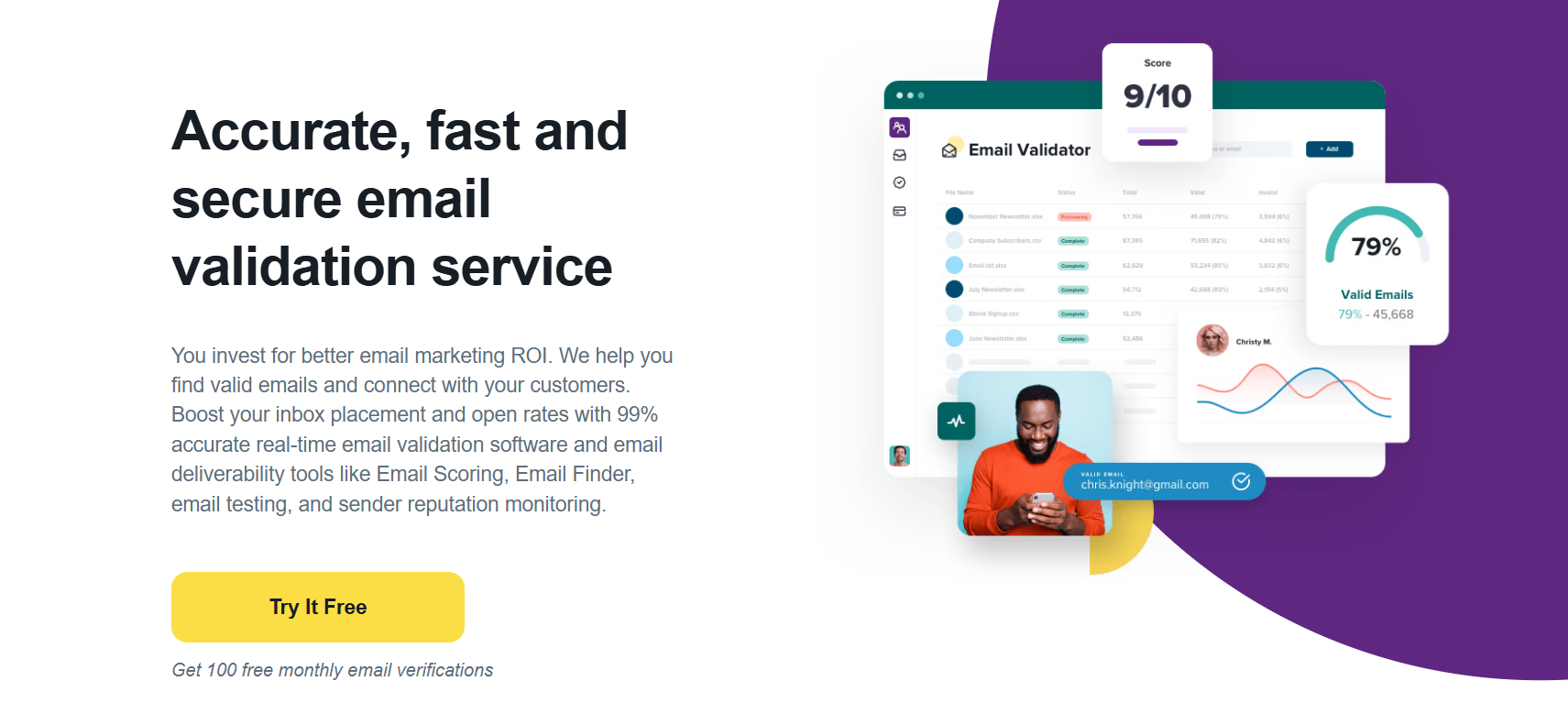
If you struggle with bounce rates, you’ll need an AI marketing tool like ZeroBounce. This platform specializes in email deliverability and validation.
It checks for invalid, misspelled, and disposable email addresses and identifies spam traps and abuse emails to improve the sender’s reputation. You can track your performance with email scoring and other activity data. With its pay-as-you-go pricing model, it is flexible enough for small businesses.
Hoppy Copy
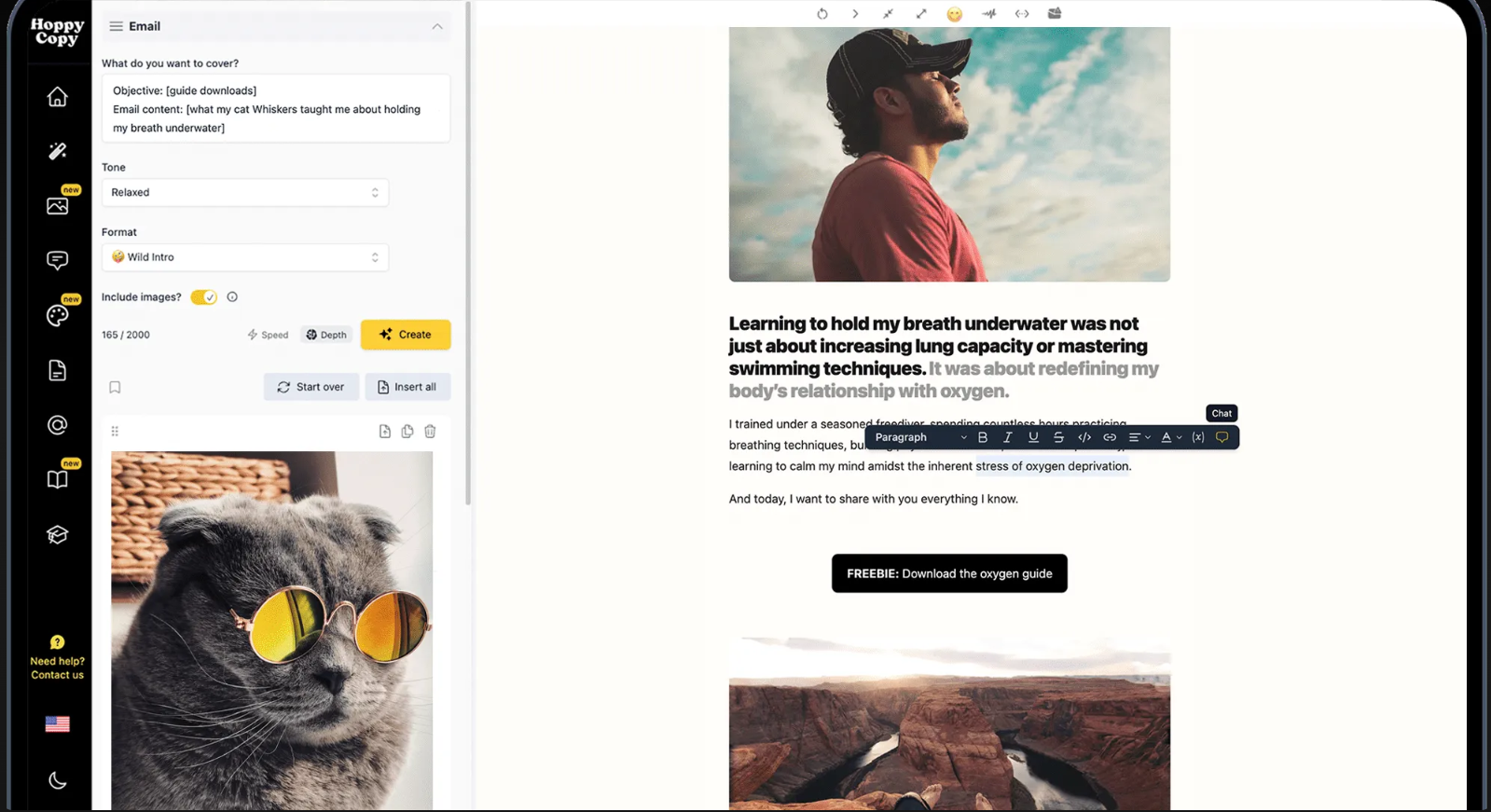
Hoppy Copy is the perfect AI marketing tool for enhancing email newsletters. It’s an editing platform that helps marketers create engaging copy and even includes a content converter to repurpose existing writing for email.
The platform uses machine learning to produce content matching the desired tone, style, and format, allowing users to tailor the copy to their brand voice easily. Hoppy Copy has a spam checker to ensure excellent delivery rates.
Chatbot
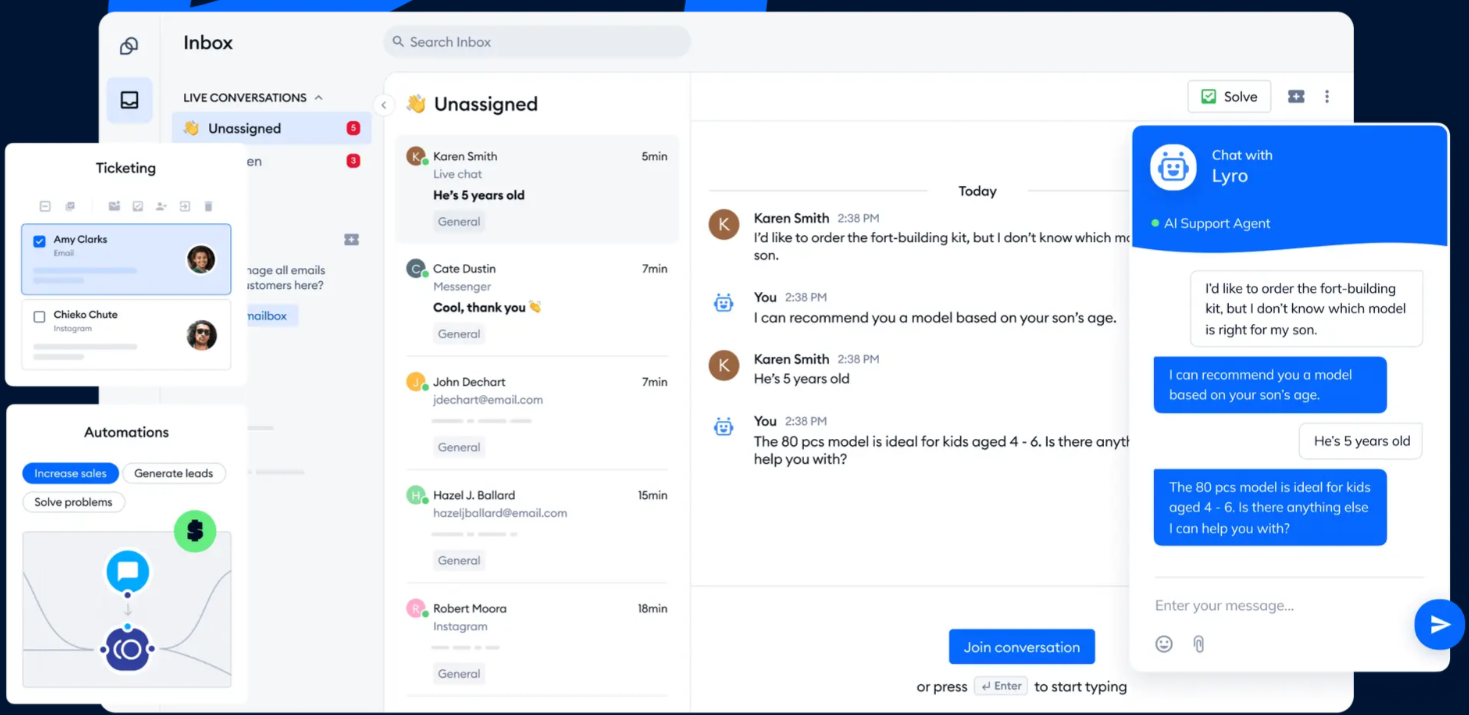
AI has revolutionized the way we communicate with customers. If you’re looking for an exceptional chatbot, we recommend Tidio. Its live chat features can help generate leads and build customer loyalty.
Designed for e-commerce and service-based businesses, Tidio allows companies to respond quickly to inquiries, improving customer satisfaction and support efficiency. The platform integrates with various communication channels, including websites, social media, and messaging apps, allowing businesses to manage all customer interactions from a single interface.
Social Media
Social media is one of the first platforms to adopt AI, with Facebook focusing on this technology as early as 2013. Let’s explore some of the best social media AI tools that benefit marketing teams the most.
Sprout Social
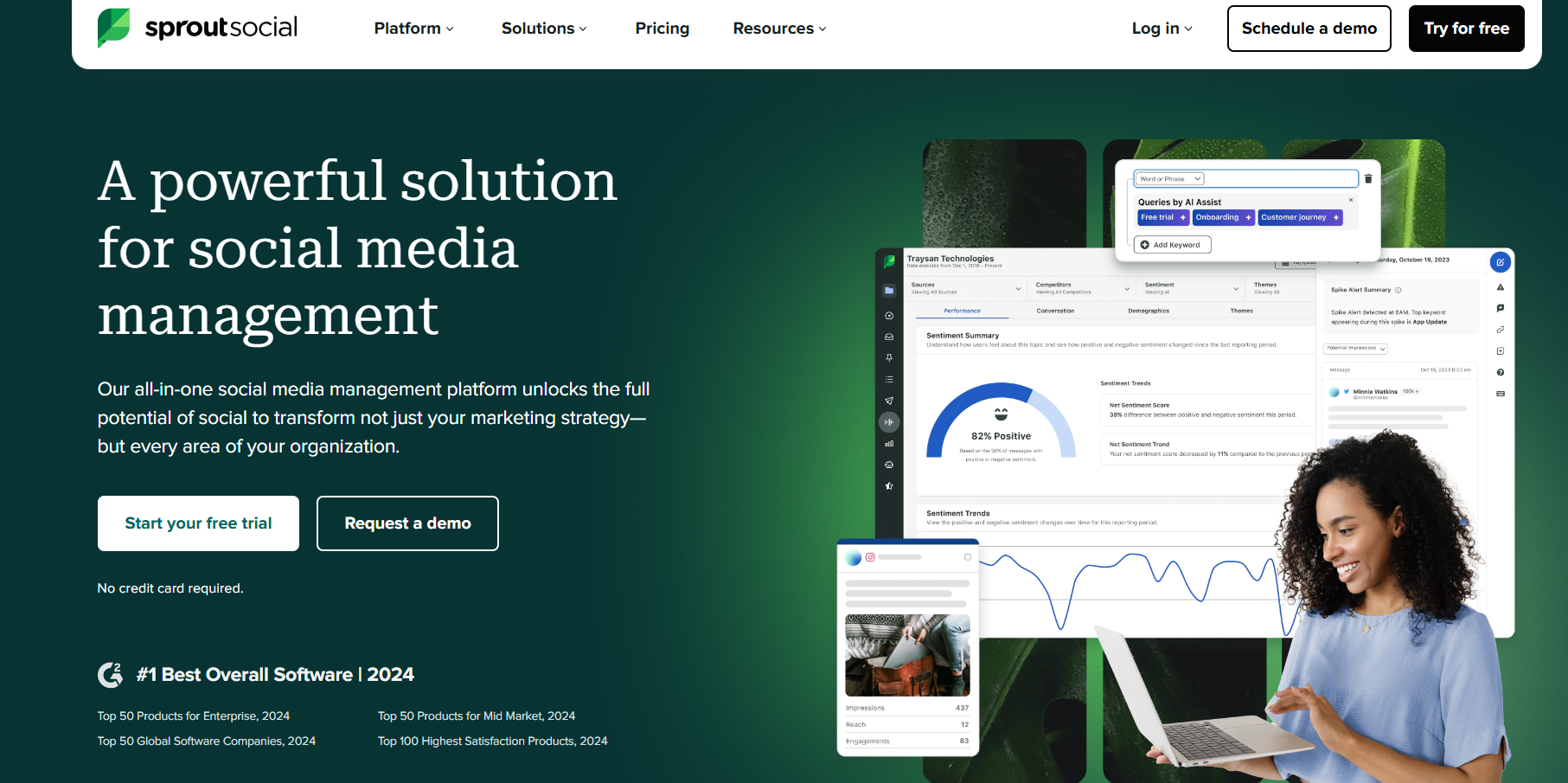
Sprout Social is an all-in-one social media AI tool. With Sprout Social, businesses can schedule posts, monitor engagement, and analyze performance across platforms like Facebook, Twitter, Instagram, and LinkedIn. It’s favored for its intuitive interface and robust analytics.
SocialPilot
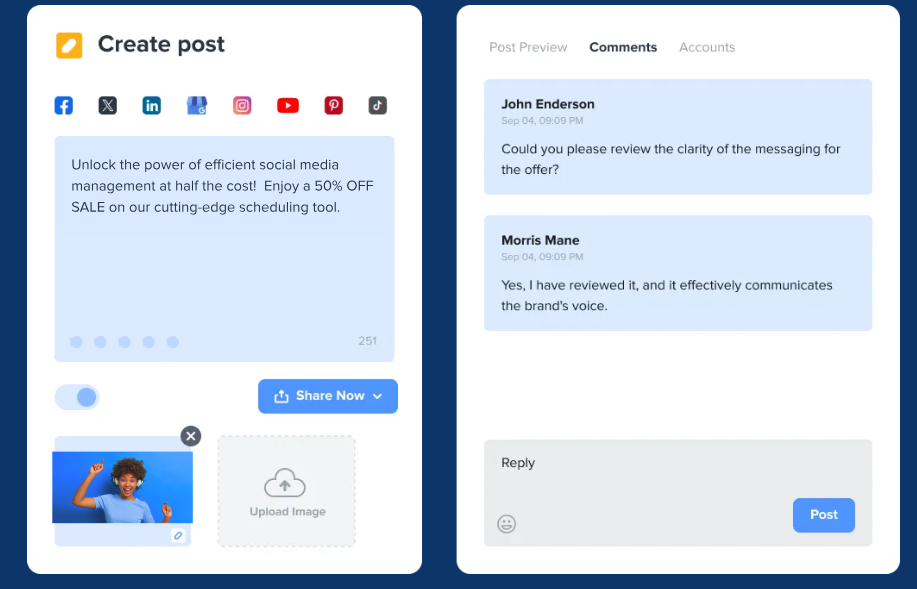
SocialPilot is one of the most advanced social media and digital marketing tools. Organizations can schedule up to 500 posts simultaneously, create content, and incite team collaboration. SocialPilot works across platforms like Facebook, Twitter, LinkedIn, and Instagram. It can automate reports so digital marketers always know their campaign performance.
Agorapulse
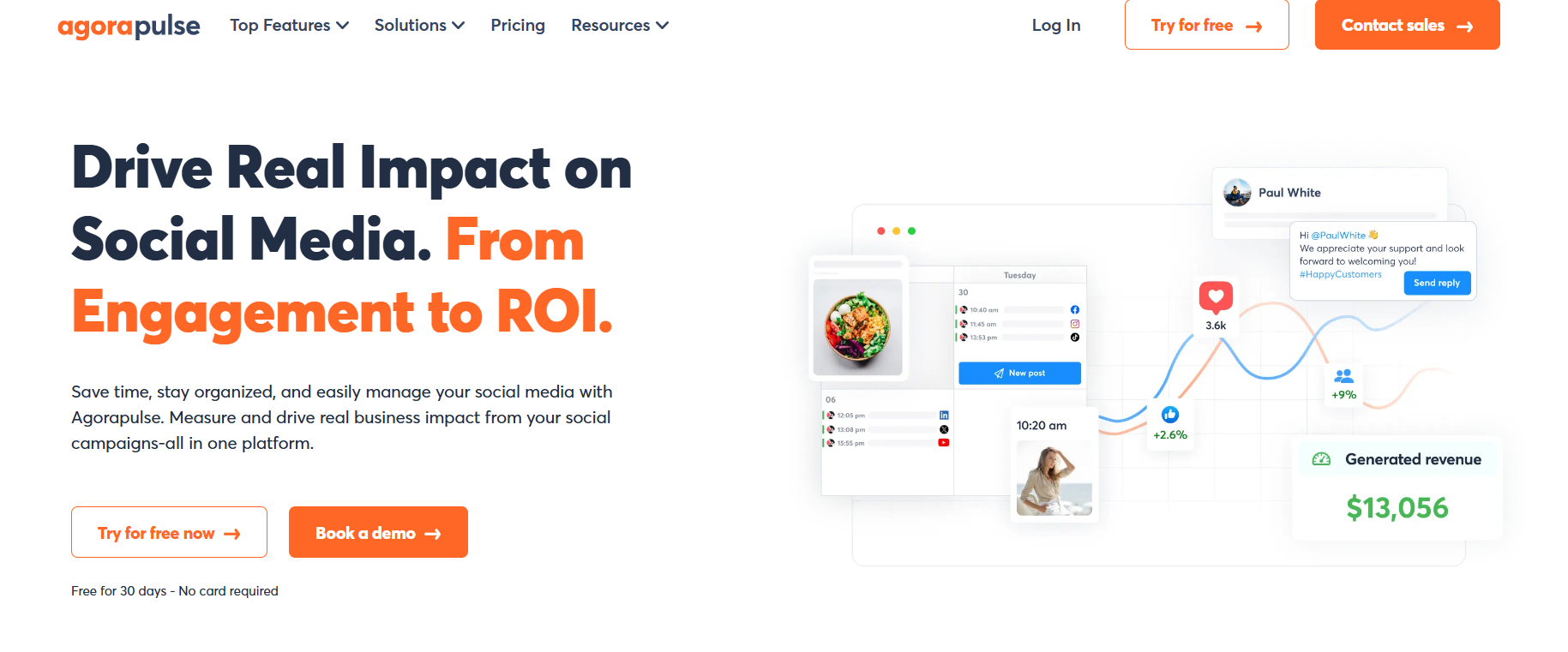
Agorapulse offers many social media and digital marketing strategies on one platform. Marketers can schedule and publish posts and monitor engagement. They can also access a unified inbox, social listening tools, and reporting features.
You can access AI writing tools that are optimized for social media engagements. Agorapulse integrates with Facebook, X, YouTube, and Instagram, as well as Google Analytics.
Loomly
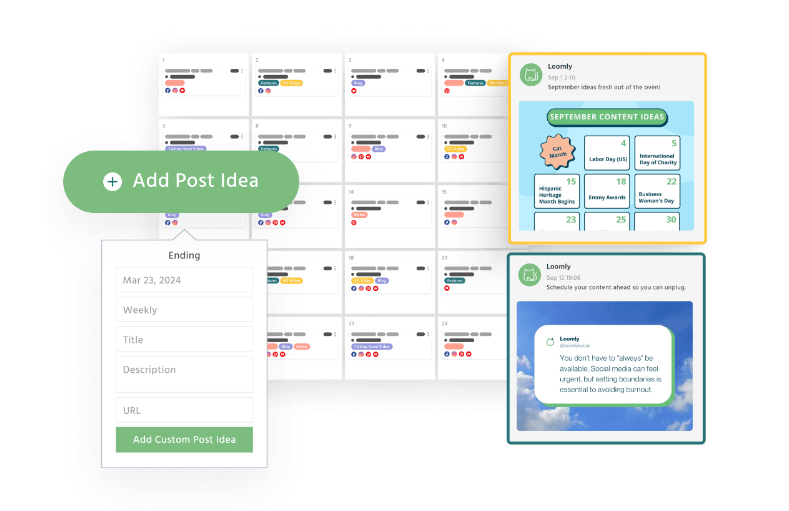
Loomly takes AI in marketing to new levels, offering a social media solution tailored for marketing teams and agencies. This program offers a content calendar to stay organized, a content library, and post ideas. Loomly integrates with Instagram, Facebook, LinkedIn, and more.
Implementing AI in Your Strategy
While AI marketing tools can help you streamline tasks quickly, switching to an automated campaign can be tricky if you don’t know the right steps. Here’s a breakdown of the marketing transformation process.
Steps for Optimizing Your Marketing With AI
Getting started with AI in your marketing requires shifting your perspective on what can be achieved. AI tools reduce the time it takes to produce certain marketing outputs, but only when your team knows how to wield it.
We recommend starting simple with this approach:
- Identify your goals: Define what you want to achieve with AI. Examples can include more personalization tactics and optimizing ad spend.
- Choose the right tools: Select tools that align with your objectives and budget. Remember that tools evolve, so it’s crucial to implement any updates and know when to switch tools.
- Train your team: Make sure your marketing team understands how to use AI tools and interpret AI-driven insights.
- Start Small and Scale: Begin with pilot projects to understand AI’s impact and expand once you see results.
Define What You Expect from Your Marketing AI
Think beyond the buzzword and meditate on where your marketing is struggling the most. Identify what areas of your business will benefit highly from data analysis and AI’s insights, and visualize the performance you’d like to see. When you determine what you need AI to do, you will be able to narrow down the search field.
For example, if you want to improve creative performance for digital ads, research AI solutions that will help your team identify top-performing creatives, so you can maximize results.
- Smartly.io is one such tool that allows you to create ads in different formats. The cloud-based automation tool cuts down the manual effort in running and editing paid campaigns and guides marketers to test and improve campaigns.
Common Challenges and How to Overcome Them
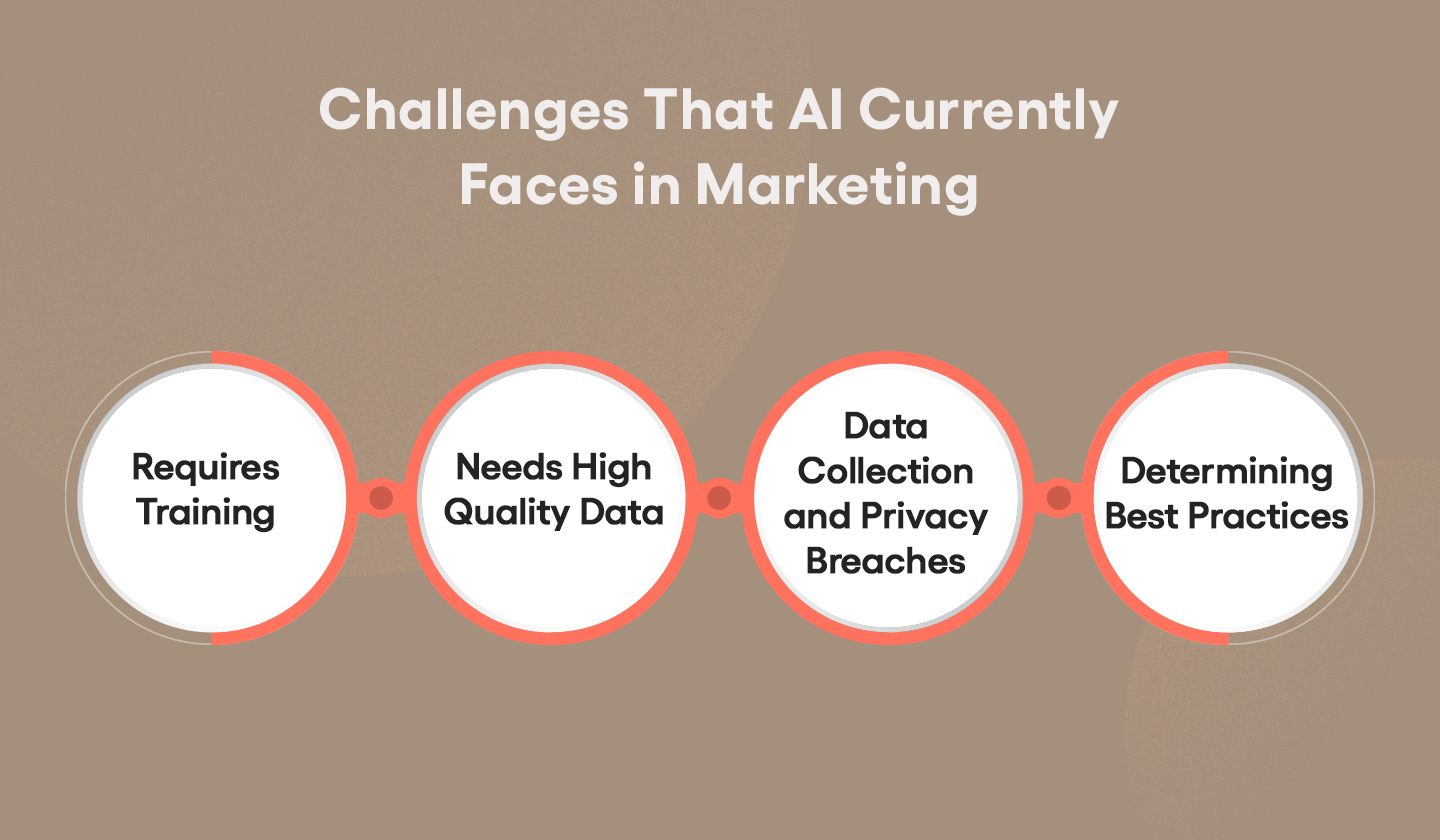
Source: Unlayer
Implementing AI may involve challenges, such as:
- Data privacy concerns
- Technical complexities
- Potential biases in algorithms
- Training
- Costs
- Lack of creativity
Clear data policies, consultation with AI experts, and regular audits of AI models for fairness and accuracy are essential.
See What Your Competitors Are Doing
Do a quick search to see what your competitors are up to. You may be able to find out what solutions they’re already using, and how well those solutions are working for them. Take a look at their blogs and social channels to see if there are any mentions of AI solutions that could benefit you.
Some ways that brands are using AI marketing:
- Chatbots
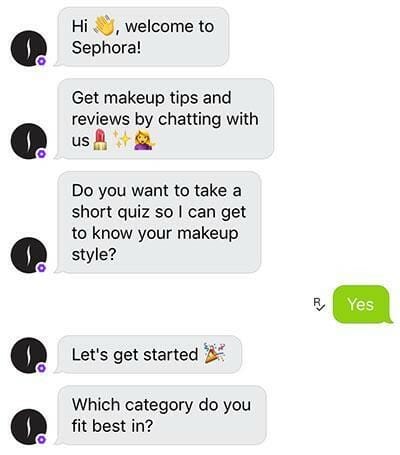
- AI-enhanced PPC advertising – AI-powered systems can help advertisers test out more ad platforms and optimize targeting.
- Personalized website – By analyzing hundreds of data points about a single user, AI can display the best-fitting offers and content.
- AI-powered content creation – Intelligent chatbots can provide near-magical customer support in various industries.
- Personalized content in email – Algorithms can map a subscriber’s website experience and email browsing data to create one-on-one personalized emails.
- Churn prediction – Machine-learning algorithms can help identify disengaged customer segments about to churn.
- Automated image recognition – Tools that analyze image data to optimize advertising strategies.
Draft Your AI Ethics Statement
Ethics in AI is a hot topic these days, with publishers like The Wall Street Journal and Harvard Business Review discussing how to foster principled software development. When you’re sure you’ve found the perfect marketing AI for your company, you’ll need to think about how to ensure that you use it ethically.
When getting started with implementation, write out how AI will make your company better, due to its transparency and ethical approach to data analysis. If you publish your ethics statement for customers to read, it will build trust in your business and credibility in using cutting-edge technologies. If you decide to keep your ethics statement private, use it to hold yourself and your team accountable so that your work remains fair and transparent.
Here are a couple examples of companies’ AI ethics statements:
The Future of AI in Marketing
Switching to an AI-driven marketing strategy is only the beginning. In the next three years, it’s predicted that 78% of marketers will use AI and automation in more than a quarter of their tasks. What can we expect to see in the future?
Emerging Trends
Some notable trends we’re anticipating in marketing AI include:
- Augmented reality for virtual shopping
- Voice-activated marketing
- Growing importance of privacy-preserving AI marketing tools
- More cross-functional alignment
In addition to these capabilities, AI software will evolve to operate autonomously, making decisions with little to no human intervention.
Ethical Considerations
A survey by CX Network states two in five consumers are concerned about ethical AI use. That’s because AI collects and analyzes user data, and moral concerns like privacy, transparency, and algorithmic bias are on consumers’ minds.
In addition to prioritizing data security and responsible AI use, brands must be transparent about AI use and remain accountable in the event of a data breach.
Optimize Your Strategy for AI Marketing
Are repetitive tasks eating into your daily operations? This has been challenging for many businesses. AI marketing is becoming the norm for many organizations; there are numerous ways that automation can optimize your strategy and countless AI marketing tools that you can use.
While AI can be the solution in many cases, it won’t replace marketing professionals. Alternatively, you can invest in an industry-leading marketing firm to position your brand in your niche and goals to increase conversions.
Contact us to schedule a consultation.
If you’re ready to level up your brand’s marketing with AI, Single Grain’s AI marketing experts can help!👇
Frequently Asked Questions on AI Marketing
-
What is the potential of AI in marketing?
AI has transformative potential in marketing. It can offer insights, automate various processes, and personalize content, significantly enhancing customer engagement.
-
What are AI marketing tools?
AI marketing tools enhance marketing campaigns by using technology such as NLP, machine learning, and sentiment analysis. Marketers can use AI technologies to improve efficiency, personalize customer interactions, and derive actionable insights from data.
-
What's the most popular AI marketing tool?
It’s difficult to know which marketing tool is most popular. But favorites among the industry’s most prominent players include HubSpot, Salesforce, Jasper, and Sprout Social.
-
My company doesn't have a lot of money. How can I afford AI marketing tools?
You can find AI marketing tools for free or with inexpensive plans. We mentioned several programs with free versions, such as HubSpot, Zapier, Milled, Grammarly, and Hemingway Editor.
-
Will AI replace human marketers?
AI is unlikely to replace human marketers entirely; instead, it will enhance their work by handling repetitive, data-driven tasks and providing deep insights that would be difficult for humans to derive manually.
While AI excels at automating functions like data analysis, personalization, and ad optimization, it lacks the creativity, emotional intelligence, and strategic intuition human marketers bring to a marketing campaign.
Related Video
For more insights and lessons about marketing, check out our Marketing School podcast on YouTube.






